Death Anniversary of Augustus Mongredien (1807 – 30-iii-1888)
Here is his Wikipedia entry
BCN Remembers Johannes Hermann Zukertort (07-ix-1842 20-vi-1888)
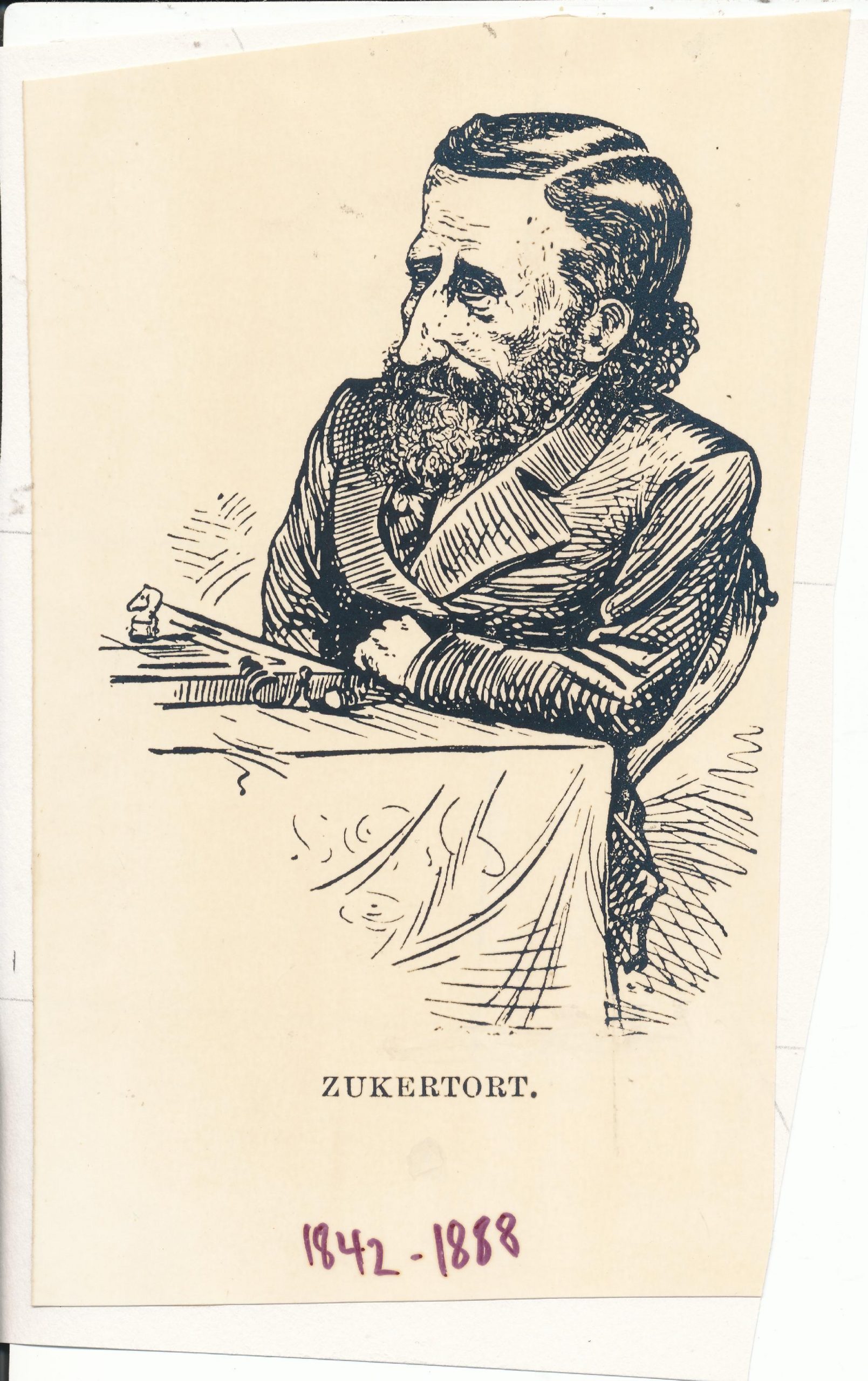
From the July 2012 editorial in British Chess Magazine we had this report :
“Johann Hermann Zukertort’s (1842-1888) grave was rededicated last month in London’s crowded Brompton Cemetery, largely thanks to an initiative led by Stuart Conquest. The resting place of one of the leading players of the nineteenth century was recorded but the grave had fallen into terrible dis-repair. See BCM 1888, pp.307-8 and p.338-340 for the obituary of the great man. We read that his death ‘was terribly sudden’, that he was buried on 26th June, 1888 and that ‘several pretty wreaths were laid on the coffin …’”
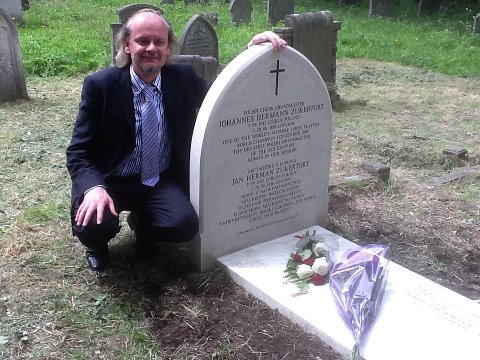
From The Oxford Companion to Chess by Hooper & Whyld :
Polish-born Jew, from about 1871 to 1886 second player in the world after Steinitz. From about 1862 to 1866 Zukertort, then living in Breslau, played many friendly games with Anderssen, at first receiving odds of a knight but soon meeting on even terms. They played two matches in Berlin, Zukertort losing the first in 1868 (+3 = 1—8) and winning the second in 1871 (+5 — 2).
In 1872 a group of London players, anxious to find someone who could defeat Steinitz, paid Zukertort 20 guineas to come to England. He came, he stayed, but he failed to beat Steinitz.
Zukertort took third place after Steinitz and Blackburne at London 1872, the strongest tournament in which He had yet played, and later in the year was decisively beaten by Steinitz in match play ( + 1=4—7). Zukertort settled in London as a professional player.
He won matches against Potter in 1872 ( + 4=8—2), Rosentalis in 1880 ( + 7=11-1), and Blackburne in 1881 ( + 7=5-2), He also had a fair record in tournament play: Leipzig 1877, second equal with Anderssen after L. Paulsen ahead of Winawer:-* Paris 1878, first ( + 14=5—3) equal with Winawer ahead of Blackburne (Zukertort won the play-off, +2=2); Berlin 1881, second alter Blackburne ahead of Winawer; and Vienna 1882, fourth equal with Mackenzie after Steinitz, Winawer, and Mason.
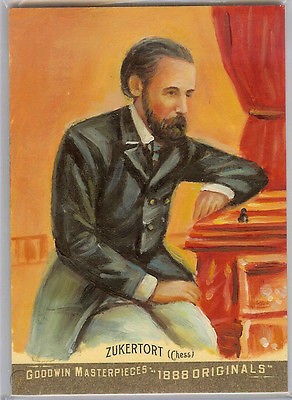
The world’s nine best players were among the competitors in the double-round London tournament of 1883 when Zukertort achieved his greatest victory: first prize (+22—4) three points ahead of Steinitz, the second prize winner, in seven weeks and a day he played 33 games (seven draws were replayed) and towards the end he relieved the strain by taking opiates, the cause of his losing his last three games. This victory led to the first match for the world championship, a struggle between him and Steinitz, USA, 1886. After nearly ten weeks of relentless pressure by his opponent Zukertort lost (- 1 – 5=5 —10) i winning only one of the last 15 games. His spirit crushed, his health failing, he was advised to give up competitive chess, but there was nothing else he could do. I am prepared, he said, l to be taken away at any moment.’ Seized by a stroke while playing at London’s famous coffee-house, Simpson’s Divan, he died the next day.
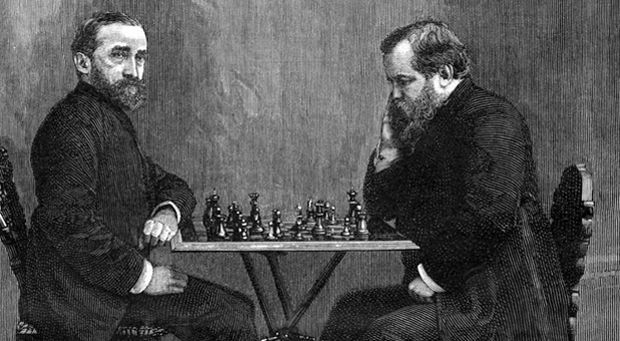
Like Anderssen, his teacher, Zukertort had a direct and straightforward style, and in combinative situations he could calculate far ahead. Having a prodigious memory he could recollect at will countless games and opening variations, a talent which may have limited his vision. (For his match with Steinitz in 1872 his extensive opening preparations brought him only one win. Steinitz was the better player in unfamiliar situations.) As an annotator and analyst Zukertort was outstanding in his time, and much of his work in these fields appeared in the Chess Monthly which he and Hoffer edited from 1879 to 1888.
Zukertort read widely and what he read became, as he said ‘iron-printed in my head’. Hoffer recalls Zukertort holding a visitor from India spellbound with a convincing and detailed account of a tiger-hunt, although it must have been outside his experience. Zukertort’s own account of his early life was reported in the Norfolk News, 16 Nov. 1872, He claimed aristocratic (Prussian and Polish) descent, and fluency in nine languages. “He learnt one language to read Dante, another to read Cervantes, and a third, Sanskrit, to trace the origin of chess,’ Besides the study of theology, philology, and social science he is also an original thinker on some of the problems that perplex humanity , ” He is ‘an accomplished swordsman, the best domino player in Berlin, one of the best whist players living, and so good a pistol shot that at fifteen paces he is morally certain to hit the ace of hearts . , , has found time to play 6,000 games of chess with Anderssen alone … a pupil of Moscheles, and in 1862-6 musical critic of the first journal in Silesia … is also a military veteran … he served in the Danish, in the Austrian, and in the French campaign , , , he was present at the following engagements, viz, in Denmark, Missunde, Duppcl, and Alsen; in Austria, Trauienau, Koniginhof, Kdniggratz (Sadowa), and Blumcnau; in France, Spicheeren, Pange (Vionville), Gravelotte, Noisevillc, and all other affairs before Metz, Twice dangerously wounded, and once left for dead upon the field, he is entitled to wear seven medals besides the orders of the Red Eagle and the Iron Cross, . . . He obtained the degree of M.D. at Breslau in 1865, having chiefly devoted his attention to chemistry under Professor Bunsen at Heidelberg, and to physiology at Berlin under Professor Virchow … is now on the staff of Prince Bismarck’s private organ, the Allgemeine Zetiling, and is chief editor of a political journal which receives “officios’” from the Government at Berlin. He is . . . the author of the Grosses Schach Handbuck and a Leitfaden , and , . . was for several years editor of the Neue Berliner Schachzeitung. ’ There is some truth in the last sentence: he was co-author of the books, co-editor of the chess magazine.
A. Olson, J. H. Zukertort (1912) is a collection of 201 games with Swedish text.
From The Encyclopedia of Chess by Anne Sunnucks
“One of the leading players of the last century, Zukertort was born in Riga on 7th September 1842. His father was a Prussian and his mother a Pole. When he was 13, his family moved to Breslau. After studying chemistry at Heidelberg and physiology at Berlin, he obtained his doctorate of medicine at Breslau University in 1865. He served as a doctor with the Prussian Army during his country’s wars against Denmark, Austria and France and was decorated for gallantry.
Zukertort was a man of many talents. He had a prodigious memory, and it was said that he never forgot a game he had played. He spoke 11 languages, and he was an excellent pistol shot and fencer but it was journalism and chess that he chose for a career.
Zukertort learned to play chess when he was 18, and two years later he met Anderssen and became his pupil. Within three years he had become one of the strongest players in North Germany. He first drew attention to himself as a blindfold simultaneous player. In 1868, he gave a simultaneous blindfold display against seven players in Berlin. This was his first blindfold performan@, and it was so successful that he gave several further performances, almost immediately increasing the number of his opponents to 12.
Between 1867 and 1871, he was joint editor with Anderssen of the Neue Berliner Schachzeityng. In 1871 he played a match against Anderssen, probably the second strongest player in the world at that time, and beat_him by 5-2. Following this victory, he was invited to take part in the 1872 London Tournament. He came 3rd and, probably because he was disappointed at his result, immediately challenged – the winner, Steinitz, to a match for the title of World Champion. Steinitz had claimed this title after his victory over Anderssen in 1866. Zukertort lost the match by + 1 -7 :4.
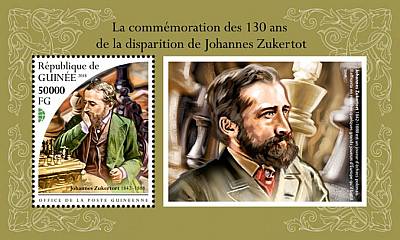
Meanwhile, Zukertort had decided to make England his permanent home and became a naturalised Englishman in l878.
Zukertort tied with Anderssen for 2nd prize in a master tournament in Leipzig in 1877, but his first major international event was Paris 1878, when he tied for lst place with Winawer and won the play-oft. In 1880 he beat the French champion, Rosenthal, in a match 7-1, and the following year he beat Blackburne +7 -2 – 5. The greatest performance of his career came in 1883, when in the London Tournament he won lst prize, three points ahead of Steinitz, who came 2nd. His victory was certain two weeks before the end of the tournament when he had a score of 22 out of 23. With victory secure, he went on to lose his last three games, the strain having proved too much.
Zukertort was advised by his doctor to give up serious chess but he refused and within a short time left England for a chess tour of the United States, Canada and Europe. On his return from this tour, he left almost immediately to play a second match for the world title against Steinitz. This took place in 1886. Zukertort was in no fit state of health
for such a match, and it proved too much for him. He lost by +5 -10 =5 and returned to England a physical and nervous wreck.
Zukertort never fully recovered. He continued to play chess, but with little success. He died at Charing Cross Hospital on 20th June 1888 of cerebral haemorrhage, following a game at Simpson’s ‘Divan’.”
From The Encyclopedia of Chess by Harry Golombek :
“One of the most talented players of all time and possibly an English Prussian Polish Jewish grandmaster, the antecedents and early career of Zukertort are shrouded in mystery, a mystery that was the more complete in that the only account of these comes from Zukertort with a lack of corroboration so great that perhaps he really was telling the truth. Whatever the truth may be it is certain that he was a great chess player, one of those who carry with them the aura of certain genius. According to Zukertort, then, he was born in Lublin of mixed Prussian and Polish descent and his mother was the Baroness Krzyzanovska. The name of his mother sounds incredibly like an invention of W. C. Fields and it is difficult to believe that his father’s name, Zukertort, was not Jewish.
Again according to Zukertort he studied chemistry at Heidelberg and physiology at Berlin, claiming to have obtained his doctorate of medicine at Breslau University. His versatility was astonishing. He spoke nine languages including Hebrew and was acquainted with several more. He had been a soldier, having fought in several campaigns for Prussia against Austria, Denmark and France; and once had been left for dead on the battlefield.
A music critic, editor of a political paper, on the staff of Bismarck’s newspaper, the Allgemeine Zeitung; gifted with a memory so colossal that he never forgot a game he played; a consummate fencer, a blindfold simultaneous player of undoubted repute (he had played as many as fifteen simultaneously blindfold) and a grandmaster with justified pretensions towards the world title: most of these attributes we have to take on Zukertort’s word. But there is enough left that is substantiated to show his great importance in the history of chess.
His early chess career had much to do with Anderssen whom he beat in a match, when Anderssen had grown old, in 1871 in Germany by +5-2, having lost a previous match to him in Berlin in 1868 by +3 -8 =1. On the strength of his win over Anderssen in the second match he was invited to play in a small but strong tournament in London in 1872 where he came 3rd below Steinitz and Blackburne. Immediately afterwards he played a match with Steinitz in which he was overwhelmingly defeated by +1-7 =4.It is unlikely that this was for the World Championship since no mention was made of the title at the time and the stakes were small, £2O for the winner and £l0 for the loser.
Despite this disastrous loss, which contained the seeds of further disasters, Zukertort felt that London was his true home and decided to stay in England, becoming a naturalized citizen in 1878. His results in tournament and match play from then on showed a steep upward curve. He was 2nd in London 1876, lst in a small tournament in Cologne 1877 and :2nd at Leipzis that year. He came lst in a big tournament at Paris 1878 where he tied with Winawer and won the play-off.
In 1880 he won a match in London against Rosenthal by +7 -l =11 and in the following year he was 2nd to Blackburne in Berlin. He was no less than 3 points behind Blackburne but he avenged this by beating him in a match in London the same year by +7 -2 =5.
A comparative setback came in a great tournament at Vienna in 1882 when he tied for fourth place with Mackenzie, below Steinitz, Winawer and Mason but in 1883 came the peak of his career when
he won lst prize in the great London tournament, 3 points ahead of Steinitz and 5.5 points ahead of Blackburne who came 3rd.
The remarkable nature of his victory is to be seen from the fact that he was sure of first prize with some two weeks still to go when he had a score of 22/23. But, ominously, his health was giving way and he had been sustaining himself by the use of drugs. He lost his last three games. It is very probable that this high point in his career was also the time when his health began to deteriorate under the excessive nervous strains by his conscious efforts to out rival Steinitz.
Thus, though he had been warned by his doctor he refused to abandon serious play and in 1886 he played his match for the World Championship against Steinitz in the USA, losing by +S -10 =5. The strain was this time too great an and he returned to England with his health completely shattered.
This was reflected in his subsequent results. =7th in London 1886 and =3rd in a smaller tournament at Nottingham that year, he had disastrous results throughout 1887: =l5th at Frankfurt-am-Main, 4th in a small tournament in London and a match loss there to Blackburne by +1-5:8.
In the last year of his life he was =7th in London in 1888 playing to the last possible moment, he died from a cerebral haemorrhage after a game at Simpson’s Divan.
Despite a career that stopped as if it were halfway, Zukertort is clearly one of the chess immortals and there is about his best game a sort of resilient and shining splendour that no other player possesses.”
Zukertort was buried in the Brompton Cemetry. He are details.
The grave was rededicated in 2012 thanks to the efforts of many chess enthusiasts.
Several opening variations have been named after Zukertort :
The Zukertort Defence in the Vienna Game, a variation advocated by Zukertort from 1871.
After 6 exd5 Bg4T 7 Nf3 Black castles, sacrificing a piece for counterattack :
The Zukertort Opening, 1.Nf3 abhorred by Ruy Lopez, used by Zukertort always as a preliminary
to 2.d4, now the fourth most popular opening move, after 1.e4, 1.d4, and 1 c4.
The Zukertort variation, in the Spanish opening, favoured by Zukertort in the 1880s :
but laid to rest soon after.
The Zukertort Variation in the Philidor Defence :
Possibly the Colle-Zukertort Opening is the most well-known
and still continues to be written about to this day.
He was inducted into the World Chess Hall of Fame in 2016.
Here is an interesting article from the ruchess web site.
Dominic Lawson wrote this article in 2014.
An interesting article from chess.com
Here is his Wikipedia entry
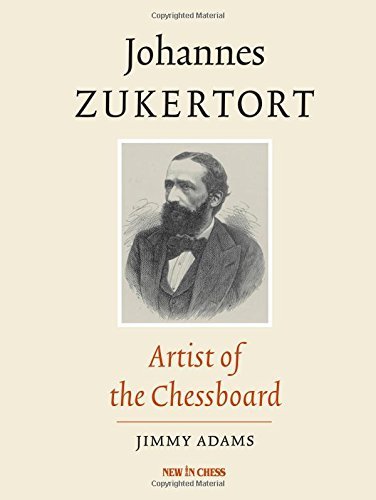
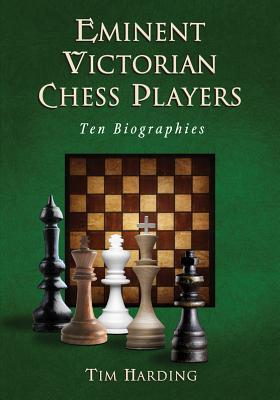
BCN Remembers Johannes Hermann Zukertort (07-ix-1842 20-vi-1888)

From the July 2012 editorial in British Chess Magazine we had this report :
“Johann Hermann Zukertort’s (1842-1888) grave was rededicated last month in London’s crowded Brompton Cemetery, largely thanks to an initiative led by Stuart Conquest. The resting place of one of the leading players of the nineteenth century was recorded but the grave had fallen into terrible dis-repair. See BCM 1888, pp.307-8 and p.338-340 for the obituary of the great man. We read that his death ‘was terribly sudden’, that he was buried on 26th June, 1888 and that ‘several pretty wreaths were laid on the coffin …’”

From The Oxford Companion to Chess by Hooper & Whyld :
Polish-born Jew, from about 1871 to 1886 second player in the world after Steinitz. From about 1862 to 1866 Zukertort, then living in Breslau, played many friendly games with Anderssen, at first receiving odds of a knight but soon meeting on even terms. They played two matches in Berlin, Zukertort losing the first in 1868 (+3 = 1—8) and winning the second in 1871 (+5 — 2).
In 1872 a group of London players, anxious to find someone who could defeat Steinitz, paid Zukertort 20 guineas to come to England. He came, he stayed, but he failed to beat Steinitz.
Zukertort took third place after Steinitz and Blackburne at London 1872, the strongest tournament in which He had yet played, and later in the year was decisively beaten by Steinitz in match play ( + 1=4—7). Zukertort settled in London as a professional player.
He won matches against Potter in 1872 ( + 4=8—2), Rosentalis in 1880 ( + 7=11-1), and Blackburne in 1881 ( + 7=5-2), He also had a fair record in tournament play: Leipzig 1877, second equal with Anderssen after L. Paulsen ahead of Winawer:-* Paris 1878, first ( + 14=5—3) equal with Winawer ahead of Blackburne (Zukertort won the play-off, +2=2); Berlin 1881, second alter Blackburne ahead of Winawer; and Vienna 1882, fourth equal with Mackenzie after Steinitz, Winawer, and Mason.

The world’s nine best players were among the competitors in the double-round London tournament of 1883 when Zukertort achieved his greatest victory: first prize (+22—4) three points ahead of Steinitz, the second prize winner, in seven weeks and a day he played 33 games (seven draws were replayed) and towards the end he relieved the strain by taking opiates, the cause of his losing his last three games. This victory led to the first match for the world championship, a struggle between him and Steinitz, USA, 1886. After nearly ten weeks of relentless pressure by his opponent Zukertort lost (- 1 – 5=5 —10) i winning only one of the last 15 games. His spirit crushed, his health failing, he was advised to give up competitive chess, but there was nothing else he could do. I am prepared, he said, l to be taken away at any moment.’ Seized by a stroke while playing at London’s famous coffee-house, Simpson’s Divan, he died the next day.

Like Anderssen, his teacher, Zukertort had a direct and straightforward style, and in combinative situations he could calculate far ahead. Having a prodigious memory he could recollect at will countless games and opening variations, a talent which may have limited his vision. (For his match with Steinitz in 1872 his extensive opening preparations brought him only one win. Steinitz was the better player in unfamiliar situations.) As an annotator and analyst Zukertort was outstanding in his time, and much of his work in these fields appeared in the Chess Monthly which he and Hoffer edited from 1879 to 1888.
Zukertort read widely and what he read became, as he said ‘iron-printed in my head’. Hoffer recalls Zukertort holding a visitor from India spellbound with a convincing and detailed account of a tiger-hunt, although it must have been outside his experience. Zukertort’s own account of his early life was reported in the Norfolk News, 16 Nov. 1872, He claimed aristocratic (Prussian and Polish) descent, and fluency in nine languages. “He learnt one language to read Dante, another to read Cervantes, and a third, Sanskrit, to trace the origin of chess,’ Besides the study of theology, philology, and social science he is also an original thinker on some of the problems that perplex humanity , ” He is ‘an accomplished swordsman, the best domino player in Berlin, one of the best whist players living, and so good a pistol shot that at fifteen paces he is morally certain to hit the ace of hearts . , , has found time to play 6,000 games of chess with Anderssen alone … a pupil of Moscheles, and in 1862-6 musical critic of the first journal in Silesia … is also a military veteran … he served in the Danish, in the Austrian, and in the French campaign , , , he was present at the following engagements, viz, in Denmark, Missunde, Duppcl, and Alsen; in Austria, Trauienau, Koniginhof, Kdniggratz (Sadowa), and Blumcnau; in France, Spicheeren, Pange (Vionville), Gravelotte, Noisevillc, and all other affairs before Metz, Twice dangerously wounded, and once left for dead upon the field, he is entitled to wear seven medals besides the orders of the Red Eagle and the Iron Cross, . . . He obtained the degree of M.D. at Breslau in 1865, having chiefly devoted his attention to chemistry under Professor Bunsen at Heidelberg, and to physiology at Berlin under Professor Virchow … is now on the staff of Prince Bismarck’s private organ, the Allgemeine Zetiling, and is chief editor of a political journal which receives “officios’” from the Government at Berlin. He is . . . the author of the Grosses Schach Handbuck and a Leitfaden , and , . . was for several years editor of the Neue Berliner Schachzeitung. ’ There is some truth in the last sentence: he was co-author of the books, co-editor of the chess magazine.
A. Olson, J. H. Zukertort (1912) is a collection of 201 games with Swedish text.
From The Encyclopedia of Chess by Anne Sunnucks
“One of the leading players of the last century, Zukertort was born in Riga on 7th September 1842. His father was a Prussian and his mother a Pole. When he was 13, his family moved to Breslau. After studying chemistry at Heidelberg and physiology at Berlin, he obtained his doctorate of medicine at Breslau University in 1865. He served as a doctor with the Prussian Army during his country’s wars against Denmark, Austria and France and was decorated for gallantry.
Zukertort was a man of many talents. He had a prodigious memory, and it was said that he never forgot a game he had played. He spoke 11 languages, and he was an excellent pistol shot and fencer but it was journalism and chess that he chose for a career.
Zukertort learned to play chess when he was 18, and two years later he met Anderssen and became his pupil. Within three years he had become one of the strongest players in North Germany. He first drew attention to himself as a blindfold simultaneous player. In 1868, he gave a simultaneous blindfold display against seven players in Berlin. This was his first blindfold performan@, and it was so successful that he gave several further performances, almost immediately increasing the number of his opponents to 12.
Between 1867 and 1871, he was joint editor with Anderssen of the Neue Berliner Schachzeityng. In 1871 he played a match against Anderssen, probably the second strongest player in the world at that time, and beat_him by 5-2. Following this victory, he was invited to take part in the 1872 London Tournament. He came 3rd and, probably because he was disappointed at his result, immediately challenged – the winner, Steinitz, to a match for the title of World Champion. Steinitz had claimed this title after his victory over Anderssen in 1866. Zukertort lost the match by + 1 -7 :4.

Meanwhile, Zukertort had decided to make England his permanent home and became a naturalised Englishman in l878.
Zukertort tied with Anderssen for 2nd prize in a master tournament in Leipzig in 1877, but his first major international event was Paris 1878, when he tied for lst place with Winawer and won the play-oft. In 1880 he beat the French champion, Rosenthal, in a match 7-1, and the following year he beat Blackburne +7 -2 – 5. The greatest performance of his career came in 1883, when in the London Tournament he won lst prize, three points ahead of Steinitz, who came 2nd. His victory was certain two weeks before the end of the tournament when he had a score of 22 out of 23. With victory secure, he went on to lose his last three games, the strain having proved too much.
Zukertort was advised by his doctor to give up serious chess but he refused and within a short time left England for a chess tour of the United States, Canada and Europe. On his return from this tour, he left almost immediately to play a second match for the world title against Steinitz. This took place in 1886. Zukertort was in no fit state of health
for such a match, and it proved too much for him. He lost by +5 -10 =5 and returned to England a physical and nervous wreck.
Zukertort never fully recovered. He continued to play chess, but with little success. He died at Charing Cross Hospital on 20th June 1888 of cerebral haemorrhage, following a game at Simpson’s ‘Divan’.”
From The Encyclopedia of Chess by Harry Golombek :
“One of the most talented players of all time and possibly an English Prussian Polish Jewish grandmaster, the antecedents and early career of Zukertort are shrouded in mystery, a mystery that was the more complete in that the only account of these comes from Zukertort with a lack of corroboration so great that perhaps he really was telling the truth. Whatever the truth may be it is certain that he was a great chess player, one of those who carry with them the aura of certain genius. According to Zukertort, then, he was born in Lublin of mixed Prussian and Polish descent and his mother was the Baroness Krzyzanovska. The name of his mother sounds incredibly like an invention of W. C. Fields and it is difficult to believe that his father’s name, Zukertort, was not Jewish.
Again according to Zukertort he studied chemistry at Heidelberg and physiology at Berlin, claiming to have obtained his doctorate of medicine at Breslau University. His versatility was astonishing. He spoke nine languages including Hebrew and was acquainted with several more. He had been a soldier, having fought in several campaigns for Prussia against Austria, Denmark and France; and once had been left for dead on the battlefield.
A music critic, editor of a political paper, on the staff of Bismarck’s newspaper, the Allgemeine Zeitung; gifted with a memory so colossal that he never forgot a game he played; a consummate fencer, a blindfold simultaneous player of undoubted repute (he had played as many as fifteen simultaneously blindfold) and a grandmaster with justified pretensions towards the world title: most of these attributes we have to take on Zukertort’s word. But there is enough left that is substantiated to show his great importance in the history of chess.
His early chess career had much to do with Anderssen whom he beat in a match, when Anderssen had grown old, in 1871 in Germany by +5-2, having lost a previous match to him in Berlin in 1868 by +3 -8 =1. On the strength of his win over Anderssen in the second match he was invited to play in a small but strong tournament in London in 1872 where he came 3rd below Steinitz and Blackburne. Immediately afterwards he played a match with Steinitz in which he was overwhelmingly defeated by +1-7 =4.It is unlikely that this was for the World Championship since no mention was made of the title at the time and the stakes were small, £2O for the winner and £l0 for the loser.
Despite this disastrous loss, which contained the seeds of further disasters, Zukertort felt that London was his true home and decided to stay in England, becoming a naturalized citizen in 1878. His results in tournament and match play from then on showed a steep upward curve. He was 2nd in London 1876, lst in a small tournament in Cologne 1877 and :2nd at Leipzis that year. He came lst in a big tournament at Paris 1878 where he tied with Winawer and won the play-off.
In 1880 he won a match in London against Rosenthal by +7 -l =11 and in the following year he was 2nd to Blackburne in Berlin. He was no less than 3 points behind Blackburne but he avenged this by beating him in a match in London the same year by +7 -2 =5.
A comparative setback came in a great tournament at Vienna in 1882 when he tied for fourth place with Mackenzie, below Steinitz, Winawer and Mason but in 1883 came the peak of his career when
he won lst prize in the great London tournament, 3 points ahead of Steinitz and 5.5 points ahead of Blackburne who came 3rd.
The remarkable nature of his victory is to be seen from the fact that he was sure of first prize with some two weeks still to go when he had a score of 22/23. But, ominously, his health was giving way and he had been sustaining himself by the use of drugs. He lost his last three games. It is very probable that this high point in his career was also the time when his health began to deteriorate under the excessive nervous strains by his conscious efforts to out rival Steinitz.
Thus, though he had been warned by his doctor he refused to abandon serious play and in 1886 he played his match for the World Championship against Steinitz in the USA, losing by +S -10 =5. The strain was this time too great an and he returned to England with his health completely shattered.
This was reflected in his subsequent results. =7th in London 1886 and =3rd in a smaller tournament at Nottingham that year, he had disastrous results throughout 1887: =l5th at Frankfurt-am-Main, 4th in a small tournament in London and a match loss there to Blackburne by +1-5:8.
In the last year of his life he was =7th in London in 1888 playing to the last possible moment, he died from a cerebral haemorrhage after a game at Simpson’s Divan.
Despite a career that stopped as if it were halfway, Zukertort is clearly one of the chess immortals and there is about his best game a sort of resilient and shining splendour that no other player possesses.”
Zukertort was buried in the Brompton Cemetry. He are details.
The grave was rededicated in 2012 thanks to the efforts of many chess enthusiasts.
Several opening variations have been named after Zukertort :
The Zukertort Defence in the Vienna Game, a variation advocated by Zukertort from 1871.
After 6 exd5 Bg4T 7 Nf3 Black castles, sacrificing a piece for counterattack :
The Zukertort Opening, 1.Nf3 abhorred by Ruy Lopez, used by Zukertort always as a preliminary
to 2.d4, now the fourth most popular opening move, after 1.e4, 1.d4, and 1 c4.
The Zukertort variation, in the Spanish opening, favoured by Zukertort in the 1880s :
but laid to rest soon after.
The Zukertort Variation in the Philidor Defence :
Possibly the Colle-Zukertort Opening is the most well-known
and still continues to be written about to this day.
He was inducted into the World Chess Hall of Fame in 2016.
Here is an interesting article from the ruchess web site.
Dominic Lawson wrote this article in 2014.
An interesting article from chess.com
Here is his Wikipedia entry


BCN Remembers Johannes Hermann Zukertort (07-ix-1842 20-vi-1888)

From the July 2012 editorial in British Chess Magazine we had this report :
“Johann Hermann Zukertort’s (1842-1888) grave was rededicated last month in London’s crowded Brompton Cemetery, largely thanks to an initiative led by Stuart Conquest. The resting place of one of the leading players of the nineteenth century was recorded but the grave had fallen into terrible dis-repair. See BCM 1888, pp.307-8 and p.338-340 for the obituary of the great man. We read that his death ‘was terribly sudden’, that he was buried on 26th June, 1888 and that ‘several pretty wreaths were laid on the coffin …’”

From The Oxford Companion to Chess by Hooper & Whyld :
Polish-born Jew, from about 1871 to 1886 second player in the world after Steinitz. From about 1862 to 1866 Zukertort, then living in Breslau, played many friendly games with Anderssen, at first receiving odds of a knight but soon meeting on even terms. They played two matches in Berlin, Zukertort losing the first in 1868 (+3 = 1—8) and winning the second in 1871 (+5 — 2).
In 1872 a group of London players, anxious to find someone who could defeat Steinitz, paid Zukertort 20 guineas to come to England. He came, he stayed, but he failed to beat Steinitz.
Zukertort took third place after Steinitz and Blackburne at London 1872, the strongest tournament in which He had yet played, and later in the year was decisively beaten by Steinitz in match play ( + 1=4—7). Zukertort settled in London as a professional player.
He won matches against Potter in 1872 ( + 4=8—2), Rosentalis in 1880 ( + 7=11-1), and Blackburne in 1881 ( + 7=5-2), He also had a fair record in tournament play: Leipzig 1877, second equal with Anderssen after L. Paulsen ahead of Winawer:-* Paris 1878, first ( + 14=5—3) equal with Winawer ahead of Blackburne (Zukertort won the play-off, +2=2); Berlin 1881, second alter Blackburne ahead of Winawer; and Vienna 1882, fourth equal with Mackenzie after Steinitz, Winawer, and Mason.

The world’s nine best players were among the competitors in the double-round London tournament of 1883 when Zukertort achieved his greatest victory: first prize (+22—4) three points ahead of Steinitz, the second prize winner, in seven weeks and a day he played 33 games (seven draws were replayed) and towards the end he relieved the strain by taking opiates, the cause of his losing his last three games. This victory led to the first match for the world championship, a struggle between him and Steinitz, USA, 1886. After nearly ten weeks of relentless pressure by his opponent Zukertort lost (- 1 – 5=5 —10) i winning only one of the last 15 games. His spirit crushed, his health failing, he was advised to give up competitive chess, but there was nothing else he could do. I am prepared, he said, l to be taken away at any moment.’ Seized by a stroke while playing at London’s famous coffee-house, Simpson’s Divan, he died the next day.

Like Anderssen, his teacher, Zukertort had a direct and straightforward style, and in combinative situations he could calculate far ahead. Having a prodigious memory he could recollect at will countless games and opening variations, a talent which may have limited his vision. (For his match with Steinitz in 1872 his extensive opening preparations brought him only one win. Steinitz was the better player in unfamiliar situations.) As an annotator and analyst Zukertort was outstanding in his time, and much of his work in these fields appeared in the Chess Monthly which he and Hoffer edited from 1879 to 1888.
Zukertort read widely and what he read became, as he said ‘iron-printed in my head’. Hoffer recalls Zukertort holding a visitor from India spellbound with a convincing and detailed account of a tiger-hunt, although it must have been outside his experience. Zukertort’s own account of his early life was reported in the Norfolk News, 16 Nov. 1872, He claimed aristocratic (Prussian and Polish) descent, and fluency in nine languages. “He learnt one language to read Dante, another to read Cervantes, and a third, Sanskrit, to trace the origin of chess,’ Besides the study of theology, philology, and social science he is also an original thinker on some of the problems that perplex humanity , ” He is ‘an accomplished swordsman, the best domino player in Berlin, one of the best whist players living, and so good a pistol shot that at fifteen paces he is morally certain to hit the ace of hearts . , , has found time to play 6,000 games of chess with Anderssen alone … a pupil of Moscheles, and in 1862-6 musical critic of the first journal in Silesia … is also a military veteran … he served in the Danish, in the Austrian, and in the French campaign , , , he was present at the following engagements, viz, in Denmark, Missunde, Duppcl, and Alsen; in Austria, Trauienau, Koniginhof, Kdniggratz (Sadowa), and Blumcnau; in France, Spicheeren, Pange (Vionville), Gravelotte, Noisevillc, and all other affairs before Metz, Twice dangerously wounded, and once left for dead upon the field, he is entitled to wear seven medals besides the orders of the Red Eagle and the Iron Cross, . . . He obtained the degree of M.D. at Breslau in 1865, having chiefly devoted his attention to chemistry under Professor Bunsen at Heidelberg, and to physiology at Berlin under Professor Virchow … is now on the staff of Prince Bismarck’s private organ, the Allgemeine Zetiling, and is chief editor of a political journal which receives “officios’” from the Government at Berlin. He is . . . the author of the Grosses Schach Handbuck and a Leitfaden , and , . . was for several years editor of the Neue Berliner Schachzeitung. ’ There is some truth in the last sentence: he was co-author of the books, co-editor of the chess magazine.
A. Olson, J. H. Zukertort (1912) is a collection of 201 games with Swedish text.
From The Encyclopedia of Chess by Anne Sunnucks
“One of the leading players of the last century, Zukertort was born in Riga on 7th September 1842. His father was a Prussian and his mother a Pole. When he was 13, his family moved to Breslau. After studying chemistry at Heidelberg and physiology at Berlin, he obtained his doctorate of medicine at Breslau University in 1865. He served as a doctor with the Prussian Army during his country’s wars against Denmark, Austria and France and was decorated for gallantry.
Zukertort was a man of many talents. He had a prodigious memory, and it was said that he never forgot a game he had played. He spoke 11 languages, and he was an excellent pistol shot and fencer but it was journalism and chess that he chose for a career.
Zukertort learned to play chess when he was 18, and two years later he met Anderssen and became his pupil. Within three years he had become one of the strongest players in North Germany. He first drew attention to himself as a blindfold simultaneous player. In 1868, he gave a simultaneous blindfold display against seven players in Berlin. This was his first blindfold performan@, and it was so successful that he gave several further performances, almost immediately increasing the number of his opponents to 12.
Between 1867 and 1871, he was joint editor with Anderssen of the Neue Berliner Schachzeityng. In 1871 he played a match against Anderssen, probably the second strongest player in the world at that time, and beat_him by 5-2. Following this victory, he was invited to take part in the 1872 London Tournament. He came 3rd and, probably because he was disappointed at his result, immediately challenged – the winner, Steinitz, to a match for the title of World Champion. Steinitz had claimed this title after his victory over Anderssen in 1866. Zukertort lost the match by + 1 -7 :4.

Meanwhile, Zukertort had decided to make England his permanent home and became a naturalised Englishman in l878.
Zukertort tied with Anderssen for 2nd prize in a master tournament in Leipzig in 1877, but his first major international event was Paris 1878, when he tied for lst place with Winawer and won the play-oft. In 1880 he beat the French champion, Rosenthal, in a match 7-1, and the following year he beat Blackburne +7 -2 – 5. The greatest performance of his career came in 1883, when in the London Tournament he won lst prize, three points ahead of Steinitz, who came 2nd. His victory was certain two weeks before the end of the tournament when he had a score of 22 out of 23. With victory secure, he went on to lose his last three games, the strain having proved too much.
Zukertort was advised by his doctor to give up serious chess but he refused and within a short time left England for a chess tour of the United States, Canada and Europe. On his return from this tour, he left almost immediately to play a second match for the world title against Steinitz. This took place in 1886. Zukertort was in no fit state of health
for such a match, and it proved too much for him. He lost by +5 -10 =5 and returned to England a physical and nervous wreck.
Zukertort never fully recovered. He continued to play chess, but with little success. He died at Charing Cross Hospital on 20th June 1888 of cerebral haemorrhage, following a game at Simpson’s ‘Divan’.”
From The Encyclopedia of Chess by Harry Golombek :
“One of the most talented players of all time and possibly an English Prussian Polish Jewish grandmaster, the antecedents and early career of Zukertort are shrouded in mystery, a mystery that was the more complete in that the only account of these comes from Zukertort with a lack of corroboration so great that perhaps he really was telling the truth. Whatever the truth may be it is certain that he was a great chess player, one of those who carry with them the aura of certain genius. According to Zukertort, then, he was born in Lublin of mixed Prussian and Polish descent and his mother was the Baroness Krzyzanovska. The name of his mother sounds incredibly like an invention of W. C. Fields and it is difficult to believe that his father’s name, Zukertort, was not Jewish.
Again according to Zukertort he studied chemistry at Heidelberg and physiology at Berlin, claiming to have obtained his doctorate of medicine at Breslau University. His versatility was astonishing. He spoke nine languages including Hebrew and was acquainted with several more. He had been a soldier, having fought in several campaigns for Prussia against Austria, Denmark and France; and once had been left for dead on the battlefield.
A music critic, editor of a political paper, on the staff of Bismarck’s newspaper, the Allgemeine Zeitung; gifted with a memory so colossal that he never forgot a game he played; a consummate fencer, a blindfold simultaneous player of undoubted repute (he had played as many as fifteen simultaneously blindfold) and a grandmaster with justified pretensions towards the world title: most of these attributes we have to take on Zukertort’s word. But there is enough left that is substantiated to show his great importance in the history of chess.
His early chess career had much to do with Anderssen whom he beat in a match, when Anderssen had grown old, in 1871 in Germany by +5-2, having lost a previous match to him in Berlin in 1868 by +3 -8 =1. On the strength of his win over Anderssen in the second match he was invited to play in a small but strong tournament in London in 1872 where he came 3rd below Steinitz and Blackburne. Immediately afterwards he played a match with Steinitz in which he was overwhelmingly defeated by +1-7 =4.It is unlikely that this was for the World Championship since no mention was made of the title at the time and the stakes were small, £2O for the winner and £l0 for the loser.
Despite this disastrous loss, which contained the seeds of further disasters, Zukertort felt that London was his true home and decided to stay in England, becoming a naturalized citizen in 1878. His results in tournament and match play from then on showed a steep upward curve. He was 2nd in London 1876, lst in a small tournament in Cologne 1877 and :2nd at Leipzis that year. He came lst in a big tournament at Paris 1878 where he tied with Winawer and won the play-off.
In 1880 he won a match in London against Rosenthal by +7 -l =11 and in the following year he was 2nd to Blackburne in Berlin. He was no less than 3 points behind Blackburne but he avenged this by beating him in a match in London the same year by +7 -2 =5.
A comparative setback came in a great tournament at Vienna in 1882 when he tied for fourth place with Mackenzie, below Steinitz, Winawer and Mason but in 1883 came the peak of his career when
he won lst prize in the great London tournament, 3 points ahead of Steinitz and 5.5 points ahead of Blackburne who came 3rd.
The remarkable nature of his victory is to be seen from the fact that he was sure of first prize with some two weeks still to go when he had a score of 22/23. But, ominously, his health was giving way and he had been sustaining himself by the use of drugs. He lost his last three games. It is very probable that this high point in his career was also the time when his health began to deteriorate under the excessive nervous strains by his conscious efforts to out rival Steinitz.
Thus, though he had been warned by his doctor he refused to abandon serious play and in 1886 he played his match for the World Championship against Steinitz in the USA, losing by +S -10 =5. The strain was this time too great an and he returned to England with his health completely shattered.
This was reflected in his subsequent results. =7th in London 1886 and =3rd in a smaller tournament at Nottingham that year, he had disastrous results throughout 1887: =l5th at Frankfurt-am-Main, 4th in a small tournament in London and a match loss there to Blackburne by +1-5:8.
In the last year of his life he was =7th in London in 1888 playing to the last possible moment, he died from a cerebral haemorrhage after a game at Simpson’s Divan.
Despite a career that stopped as if it were halfway, Zukertort is clearly one of the chess immortals and there is about his best game a sort of resilient and shining splendour that no other player possesses.”
Zukertort was buried in the Brompton Cemetry. He are details.
The grave was rededicated in 2012 thanks to the efforts of many chess enthusiasts.
Several opening variations have been named after Zukertort :
The Zukertort Defence in the Vienna Game, a variation advocated by Zukertort from 1871.
After 6 exd5 Bg4T 7 Nf3 Black castles, sacrificing a piece for counterattack :
The Zukertort Opening, 1.Nf3 abhorred by Ruy Lopez, used by Zukertort always as a preliminary
to 2.d4, now the fourth most popular opening move, after 1.e4, 1.d4, and 1 c4.
The Zukertort variation, in the Spanish opening, favoured by Zukertort in the 1880s :
but laid to rest soon after.
The Zukertort Variation in the Philidor Defence :
Possibly the Colle-Zukertort Opening is the most well-known
and still continues to be written about to this day.
He was inducted into the World Chess Hall of Fame in 2016.
Here is an interesting article from the ruchess web site.
Dominic Lawson wrote this article in 2014.
An interesting article from chess.com
Here is his Wikipedia entry


BCN Remembers Johannes Hermann Zukertort (07-ix-1842 20-vi-1888)

From the July 2012 editorial in British Chess Magazine we had this report :
“Johann Hermann Zukertort’s (1842-1888) grave was rededicated last month in London’s crowded Brompton Cemetery, largely thanks to an initiative led by Stuart Conquest. The resting place of one of the leading players of the nineteenth century was recorded but the grave had fallen into terrible dis-repair. See BCM 1888, pp.307-8 and p.338-340 for the obituary of the great man. We read that his death ‘was terribly sudden’, that he was buried on 26th June, 1888 and that ‘several pretty wreaths were laid on the coffin …’”

From The Oxford Companion to Chess by Hooper & Whyld :
Polish-born Jew, from about 1871 to 1886 second player in the world after Steinitz. From about 1862 to 1866 Zukertort, then living in Breslau, played many friendly games with Anderssen, at first receiving odds of a knight but soon meeting on even terms. They played two matches in Berlin, Zukertort losing the first in 1868 (+3 = 1—8) and winning the second in 1871 (+5 — 2).
In 1872 a group of London players, anxious to find someone who could defeat Steinitz, paid Zukertort 20 guineas to come to England. He came, he stayed, but he failed to beat Steinitz.
Zukertort took third place after Steinitz and Blackburne at London 1872, the strongest tournament in which He had yet played, and later in the year was decisively beaten by Steinitz in match play ( + 1=4—7). Zukertort settled in London as a professional player.
He won matches against Potter in 1872 ( + 4=8—2), Rosentalis in 1880 ( + 7=11-1), and Blackburne in 1881 ( + 7=5-2), He also had a fair record in tournament play: Leipzig 1877, second equal with Anderssen after L. Paulsen ahead of Winawer:-* Paris 1878, first ( + 14=5—3) equal with Winawer ahead of Blackburne (Zukertort won the play-off, +2=2); Berlin 1881, second alter Blackburne ahead of Winawer; and Vienna 1882, fourth equal with Mackenzie after Steinitz, Winawer, and Mason.

The world’s nine best players were among the competitors in the double-round London tournament of 1883 when Zukertort achieved his greatest victory: first prize (+22—4) three points ahead of Steinitz, the second prize winner, in seven weeks and a day he played 33 games (seven draws were replayed) and towards the end he relieved the strain by taking opiates, the cause of his losing his last three games. This victory led to the first match for the world championship, a struggle between him and Steinitz, USA, 1886. After nearly ten weeks of relentless pressure by his opponent Zukertort lost (- 1 – 5=5 —10) i winning only one of the last 15 games. His spirit crushed, his health failing, he was advised to give up competitive chess, but there was nothing else he could do. I am prepared, he said, l to be taken away at any moment.’ Seized by a stroke while playing at London’s famous coffee-house, Simpson’s Divan, he died the next day.

Like Anderssen, his teacher, Zukertort had a direct and straightforward style, and in combinative situations he could calculate far ahead. Having a prodigious memory he could recollect at will countless games and opening variations, a talent which may have limited his vision. (For his match with Steinitz in 1872 his extensive opening preparations brought him only one win. Steinitz was the better player in unfamiliar situations.) As an annotator and analyst Zukertort was outstanding in his time, and much of his work in these fields appeared in the Chess Monthly which he and Hoffer edited from 1879 to 1888.
Zukertort read widely and what he read became, as he said ‘iron-printed in my head’. Hoffer recalls Zukertort holding a visitor from India spellbound with a convincing and detailed account of a tiger-hunt, although it must have been outside his experience. Zukertort’s own account of his early life was reported in the Norfolk News, 16 Nov. 1872, He claimed aristocratic (Prussian and Polish) descent, and fluency in nine languages. “He learnt one language to read Dante, another to read Cervantes, and a third, Sanskrit, to trace the origin of chess,’ Besides the study of theology, philology, and social science he is also an original thinker on some of the problems that perplex humanity , ” He is ‘an accomplished swordsman, the best domino player in Berlin, one of the best whist players living, and so good a pistol shot that at fifteen paces he is morally certain to hit the ace of hearts . , , has found time to play 6,000 games of chess with Anderssen alone … a pupil of Moscheles, and in 1862-6 musical critic of the first journal in Silesia … is also a military veteran … he served in the Danish, in the Austrian, and in the French campaign , , , he was present at the following engagements, viz, in Denmark, Missunde, Duppcl, and Alsen; in Austria, Trauienau, Koniginhof, Kdniggratz (Sadowa), and Blumcnau; in France, Spicheeren, Pange (Vionville), Gravelotte, Noisevillc, and all other affairs before Metz, Twice dangerously wounded, and once left for dead upon the field, he is entitled to wear seven medals besides the orders of the Red Eagle and the Iron Cross, . . . He obtained the degree of M.D. at Breslau in 1865, having chiefly devoted his attention to chemistry under Professor Bunsen at Heidelberg, and to physiology at Berlin under Professor Virchow … is now on the staff of Prince Bismarck’s private organ, the Allgemeine Zetiling, and is chief editor of a political journal which receives “officios’” from the Government at Berlin. He is . . . the author of the Grosses Schach Handbuck and a Leitfaden , and , . . was for several years editor of the Neue Berliner Schachzeitung. ’ There is some truth in the last sentence: he was co-author of the books, co-editor of the chess magazine.
A. Olson, J. H. Zukertort (1912) is a collection of 201 games with Swedish text.
From The Encyclopedia of Chess by Anne Sunnucks
“One of the leading players of the last century, Zukertort was born in Riga on 7th September 1842. His father was a Prussian and his mother a Pole. When he was 13, his family moved to Breslau. After studying chemistry at Heidelberg and physiology at Berlin, he obtained his doctorate of medicine at Breslau University in 1865. He served as a doctor with the Prussian Army during his country’s wars against Denmark, Austria and France and was decorated for gallantry.
Zukertort was a man of many talents. He had a prodigious memory, and it was said that he never forgot a game he had played. He spoke 11 languages, and he was an excellent pistol shot and fencer but it was journalism and chess that he chose for a career.
Zukertort learned to play chess when he was 18, and two years later he met Anderssen and became his pupil. Within three years he had become one of the strongest players in North Germany. He first drew attention to himself as a blindfold simultaneous player. In 1868, he gave a simultaneous blindfold display against seven players in Berlin. This was his first blindfold performan@, and it was so successful that he gave several further performances, almost immediately increasing the number of his opponents to 12.
Between 1867 and 1871, he was joint editor with Anderssen of the Neue Berliner Schachzeityng. In 1871 he played a match against Anderssen, probably the second strongest player in the world at that time, and beat_him by 5-2. Following this victory, he was invited to take part in the 1872 London Tournament. He came 3rd and, probably because he was disappointed at his result, immediately challenged – the winner, Steinitz, to a match for the title of World Champion. Steinitz had claimed this title after his victory over Anderssen in 1866. Zukertort lost the match by + 1 -7 :4.

Meanwhile, Zukertort had decided to make England his permanent home and became a naturalised Englishman in l878.
Zukertort tied with Anderssen for 2nd prize in a master tournament in Leipzig in 1877, but his first major international event was Paris 1878, when he tied for lst place with Winawer and won the play-oft. In 1880 he beat the French champion, Rosenthal, in a match 7-1, and the following year he beat Blackburne +7 -2 – 5. The greatest performance of his career came in 1883, when in the London Tournament he won lst prize, three points ahead of Steinitz, who came 2nd. His victory was certain two weeks before the end of the tournament when he had a score of 22 out of 23. With victory secure, he went on to lose his last three games, the strain having proved too much.
Zukertort was advised by his doctor to give up serious chess but he refused and within a short time left England for a chess tour of the United States, Canada and Europe. On his return from this tour, he left almost immediately to play a second match for the world title against Steinitz. This took place in 1886. Zukertort was in no fit state of health
for such a match, and it proved too much for him. He lost by +5 -10 =5 and returned to England a physical and nervous wreck.
Zukertort never fully recovered. He continued to play chess, but with little success. He died at Charing Cross Hospital on 20th June 1888 of cerebral haemorrhage, following a game at Simpson’s ‘Divan’.”
From The Encyclopedia of Chess by Harry Golombek :
“One of the most talented players of all time and possibly an English Prussian Polish Jewish grandmaster, the antecedents and early career of Zukertort are shrouded in mystery, a mystery that was the more complete in that the only account of these comes from Zukertort with a lack of corroboration so great that perhaps he really was telling the truth. Whatever the truth may be it is certain that he was a great chess player, one of those who carry with them the aura of certain genius. According to Zukertort, then, he was born in Lublin of mixed Prussian and Polish descent and his mother was the Baroness Krzyzanovska. The name of his mother sounds incredibly like an invention of W. C. Fields and it is difficult to believe that his father’s name, Zukertort, was not Jewish.
Again according to Zukertort he studied chemistry at Heidelberg and physiology at Berlin, claiming to have obtained his doctorate of medicine at Breslau University. His versatility was astonishing. He spoke nine languages including Hebrew and was acquainted with several more. He had been a soldier, having fought in several campaigns for Prussia against Austria, Denmark and France; and once had been left for dead on the battlefield.
A music critic, editor of a political paper, on the staff of Bismarck’s newspaper, the Allgemeine Zeitung; gifted with a memory so colossal that he never forgot a game he played; a consummate fencer, a blindfold simultaneous player of undoubted repute (he had played as many as fifteen simultaneously blindfold) and a grandmaster with justified pretensions towards the world title: most of these attributes we have to take on Zukertort’s word. But there is enough left that is substantiated to show his great importance in the history of chess.
His early chess career had much to do with Anderssen whom he beat in a match, when Anderssen had grown old, in 1871 in Germany by +5-2, having lost a previous match to him in Berlin in 1868 by +3 -8 =1. On the strength of his win over Anderssen in the second match he was invited to play in a small but strong tournament in London in 1872 where he came 3rd below Steinitz and Blackburne. Immediately afterwards he played a match with Steinitz in which he was overwhelmingly defeated by +1-7 =4.It is unlikely that this was for the World Championship since no mention was made of the title at the time and the stakes were small, £2O for the winner and £l0 for the loser.
Despite this disastrous loss, which contained the seeds of further disasters, Zukertort felt that London was his true home and decided to stay in England, becoming a naturalized citizen in 1878. His results in tournament and match play from then on showed a steep upward curve. He was 2nd in London 1876, lst in a small tournament in Cologne 1877 and :2nd at Leipzis that year. He came lst in a big tournament at Paris 1878 where he tied with Winawer and won the play-off.
In 1880 he won a match in London against Rosenthal by +7 -l =11 and in the following year he was 2nd to Blackburne in Berlin. He was no less than 3 points behind Blackburne but he avenged this by beating him in a match in London the same year by +7 -2 =5.
A comparative setback came in a great tournament at Vienna in 1882 when he tied for fourth place with Mackenzie, below Steinitz, Winawer and Mason but in 1883 came the peak of his career when
he won lst prize in the great London tournament, 3 points ahead of Steinitz and 5.5 points ahead of Blackburne who came 3rd.
The remarkable nature of his victory is to be seen from the fact that he was sure of first prize with some two weeks still to go when he had a score of 22/23. But, ominously, his health was giving way and he had been sustaining himself by the use of drugs. He lost his last three games. It is very probable that this high point in his career was also the time when his health began to deteriorate under the excessive nervous strains by his conscious efforts to out rival Steinitz.
Thus, though he had been warned by his doctor he refused to abandon serious play and in 1886 he played his match for the World Championship against Steinitz in the USA, losing by +S -10 =5. The strain was this time too great an and he returned to England with his health completely shattered.
This was reflected in his subsequent results. =7th in London 1886 and =3rd in a smaller tournament at Nottingham that year, he had disastrous results throughout 1887: =l5th at Frankfurt-am-Main, 4th in a small tournament in London and a match loss there to Blackburne by +1-5:8.
In the last year of his life he was =7th in London in 1888 playing to the last possible moment, he died from a cerebral haemorrhage after a game at Simpson’s Divan.
Despite a career that stopped as if it were halfway, Zukertort is clearly one of the chess immortals and there is about his best game a sort of resilient and shining splendour that no other player possesses.”
Zukertort was buried in the Brompton Cemetry. He are details.
The grave was rededicated in 2012 thanks to the efforts of many chess enthusiasts.
Several opening variations have been named after Zukertort :
The Zukertort Defence in the Vienna Game, a variation advocated by Zukertort from 1871.
After 6 exd5 Bg4T 7 Nf3 Black castles, sacrificing a piece for counterattack :
The Zukertort Opening, 1.Nf3 abhorred by Ruy Lopez, used by Zukertort always as a preliminary
to 2.d4, now the fourth most popular opening move, after 1.e4, 1.d4, and 1 c4.
The Zukertort variation, in the Spanish opening, favoured by Zukertort in the 1880s :
but laid to rest soon after.
The Zukertort Variation in the Philidor Defence :
Possibly the Colle-Zukertort Opening is the most well-known
and still continues to be written about to this day.
He was inducted into the World Chess Hall of Fame in 2016.
Here is an interesting article from the ruchess web site.
Dominic Lawson wrote this article in 2014.
An interesting article from chess.com
Here is his Wikipedia entry


BCN Remembers Johannes Hermann Zukertort (07-ix-1842 20-vi-1888)

From the July 2012 editorial in British Chess Magazine we had this report :
“Johann Hermann Zukertort’s (1842-1888) grave was rededicated last month in London’s crowded Brompton Cemetery, largely thanks to an initiative led by Stuart Conquest. The resting place of one of the leading players of the nineteenth century was recorded but the grave had fallen into terrible dis-repair. See BCM 1888, pp.307-8 and p.338-340 for the obituary of the great man. We read that his death ‘was terribly sudden’, that he was buried on 26th June, 1888 and that ‘several pretty wreaths were laid on the coffin …’”

From The Oxford Companion to Chess by Hooper & Whyld :
Polish-born Jew, from about 1871 to 1886 second player in the world after Steinitz. From about 1862 to 1866 Zukertort, then living in Breslau, played many friendly games with Anderssen, at first receiving odds of a knight but soon meeting on even terms. They played two matches in Berlin, Zukertort losing the first in 1868 (+3 = 1—8) and winning the second in 1871 (+5 — 2).
In 1872 a group of London players, anxious to find someone who could defeat Steinitz, paid Zukertort 20 guineas to come to England. He came, he stayed, but he failed to beat Steinitz.
Zukertort took third place after Steinitz and Blackburne at London 1872, the strongest tournament in which He had yet played, and later in the year was decisively beaten by Steinitz in match play ( + 1=4—7). Zukertort settled in London as a professional player.
He won matches against Potter in 1872 ( + 4=8—2), Rosentalis in 1880 ( + 7=11-1), and Blackburne in 1881 ( + 7=5-2), He also had a fair record in tournament play: Leipzig 1877, second equal with Anderssen after L. Paulsen ahead of Winawer:-* Paris 1878, first ( + 14=5—3) equal with Winawer ahead of Blackburne (Zukertort won the play-off, +2=2); Berlin 1881, second alter Blackburne ahead of Winawer; and Vienna 1882, fourth equal with Mackenzie after Steinitz, Winawer, and Mason.

The world’s nine best players were among the competitors in the double-round London tournament of 1883 when Zukertort achieved his greatest victory: first prize (+22—4) three points ahead of Steinitz, the second prize winner, in seven weeks and a day he played 33 games (seven draws were replayed) and towards the end he relieved the strain by taking opiates, the cause of his losing his last three games. This victory led to the first match for the world championship, a struggle between him and Steinitz, USA, 1886. After nearly ten weeks of relentless pressure by his opponent Zukertort lost (- 1 – 5=5 —10) i winning only one of the last 15 games. His spirit crushed, his health failing, he was advised to give up competitive chess, but there was nothing else he could do. I am prepared, he said, l to be taken away at any moment.’ Seized by a stroke while playing at London’s famous coffee-house, Simpson’s Divan, he died the next day.

Like Anderssen, his teacher, Zukertort had a direct and straightforward style, and in combinative situations he could calculate far ahead. Having a prodigious memory he could recollect at will countless games and opening variations, a talent which may have limited his vision. (For his match with Steinitz in 1872 his extensive opening preparations brought him only one win. Steinitz was the better player in unfamiliar situations.) As an annotator and analyst Zukertort was outstanding in his time, and much of his work in these fields appeared in the Chess Monthly which he and Hoffer edited from 1879 to 1888.
Zukertort read widely and what he read became, as he said ‘iron-printed in my head’. Hoffer recalls Zukertort holding a visitor from India spellbound with a convincing and detailed account of a tiger-hunt, although it must have been outside his experience. Zukertort’s own account of his early life was reported in the Norfolk News, 16 Nov. 1872, He claimed aristocratic (Prussian and Polish) descent, and fluency in nine languages. “He learnt one language to read Dante, another to read Cervantes, and a third, Sanskrit, to trace the origin of chess,’ Besides the study of theology, philology, and social science he is also an original thinker on some of the problems that perplex humanity , ” He is ‘an accomplished swordsman, the best domino player in Berlin, one of the best whist players living, and so good a pistol shot that at fifteen paces he is morally certain to hit the ace of hearts . , , has found time to play 6,000 games of chess with Anderssen alone … a pupil of Moscheles, and in 1862-6 musical critic of the first journal in Silesia … is also a military veteran … he served in the Danish, in the Austrian, and in the French campaign , , , he was present at the following engagements, viz, in Denmark, Missunde, Duppcl, and Alsen; in Austria, Trauienau, Koniginhof, Kdniggratz (Sadowa), and Blumcnau; in France, Spicheeren, Pange (Vionville), Gravelotte, Noisevillc, and all other affairs before Metz, Twice dangerously wounded, and once left for dead upon the field, he is entitled to wear seven medals besides the orders of the Red Eagle and the Iron Cross, . . . He obtained the degree of M.D. at Breslau in 1865, having chiefly devoted his attention to chemistry under Professor Bunsen at Heidelberg, and to physiology at Berlin under Professor Virchow … is now on the staff of Prince Bismarck’s private organ, the Allgemeine Zetiling, and is chief editor of a political journal which receives “officios’” from the Government at Berlin. He is . . . the author of the Grosses Schach Handbuck and a Leitfaden , and , . . was for several years editor of the Neue Berliner Schachzeitung. ’ There is some truth in the last sentence: he was co-author of the books, co-editor of the chess magazine.
A. Olson, J. H. Zukertort (1912) is a collection of 201 games with Swedish text.
From The Encyclopedia of Chess by Anne Sunnucks
“One of the leading players of the last century, Zukertort was born in Riga on 7th September 1842. His father was a Prussian and his mother a Pole. When he was 13, his family moved to Breslau. After studying chemistry at Heidelberg and physiology at Berlin, he obtained his doctorate of medicine at Breslau University in 1865. He served as a doctor with the Prussian Army during his country’s wars against Denmark, Austria and France and was decorated for gallantry.
Zukertort was a man of many talents. He had a prodigious memory, and it was said that he never forgot a game he had played. He spoke 11 languages, and he was an excellent pistol shot and fencer but it was journalism and chess that he chose for a career.
Zukertort learned to play chess when he was 18, and two years later he met Anderssen and became his pupil. Within three years he had become one of the strongest players in North Germany. He first drew attention to himself as a blindfold simultaneous player. In 1868, he gave a simultaneous blindfold display against seven players in Berlin. This was his first blindfold performan@, and it was so successful that he gave several further performances, almost immediately increasing the number of his opponents to 12.
Between 1867 and 1871, he was joint editor with Anderssen of the Neue Berliner Schachzeityng. In 1871 he played a match against Anderssen, probably the second strongest player in the world at that time, and beat_him by 5-2. Following this victory, he was invited to take part in the 1872 London Tournament. He came 3rd and, probably because he was disappointed at his result, immediately challenged – the winner, Steinitz, to a match for the title of World Champion. Steinitz had claimed this title after his victory over Anderssen in 1866. Zukertort lost the match by + 1 -7 :4.

Meanwhile, Zukertort had decided to make England his permanent home and became a naturalised Englishman in l878.
Zukertort tied with Anderssen for 2nd prize in a master tournament in Leipzig in 1877, but his first major international event was Paris 1878, when he tied for lst place with Winawer and won the play-oft. In 1880 he beat the French champion, Rosenthal, in a match 7-1, and the following year he beat Blackburne +7 -2 – 5. The greatest performance of his career came in 1883, when in the London Tournament he won lst prize, three points ahead of Steinitz, who came 2nd. His victory was certain two weeks before the end of the tournament when he had a score of 22 out of 23. With victory secure, he went on to lose his last three games, the strain having proved too much.
Zukertort was advised by his doctor to give up serious chess but he refused and within a short time left England for a chess tour of the United States, Canada and Europe. On his return from this tour, he left almost immediately to play a second match for the world title against Steinitz. This took place in 1886. Zukertort was in no fit state of health
for such a match, and it proved too much for him. He lost by +5 -10 =5 and returned to England a physical and nervous wreck.
Zukertort never fully recovered. He continued to play chess, but with little success. He died at Charing Cross Hospital on 20th June 1888 of cerebral haemorrhage, following a game at Simpson’s ‘Divan’.”
From The Encyclopedia of Chess by Harry Golombek :
“One of the most talented players of all time and possibly an English Prussian Polish Jewish grandmaster, the antecedents and early career of Zukertort are shrouded in mystery, a mystery that was the more complete in that the only account of these comes from Zukertort with a lack of corroboration so great that perhaps he really was telling the truth. Whatever the truth may be it is certain that he was a great chess player, one of those who carry with them the aura of certain genius. According to Zukertort, then, he was born in Lublin of mixed Prussian and Polish descent and his mother was the Baroness Krzyzanovska. The name of his mother sounds incredibly like an invention of W. C. Fields and it is difficult to believe that his father’s name, Zukertort, was not Jewish.
Again according to Zukertort he studied chemistry at Heidelberg and physiology at Berlin, claiming to have obtained his doctorate of medicine at Breslau University. His versatility was astonishing. He spoke nine languages including Hebrew and was acquainted with several more. He had been a soldier, having fought in several campaigns for Prussia against Austria, Denmark and France; and once had been left for dead on the battlefield.
A music critic, editor of a political paper, on the staff of Bismarck’s newspaper, the Allgemeine Zeitung; gifted with a memory so colossal that he never forgot a game he played; a consummate fencer, a blindfold simultaneous player of undoubted repute (he had played as many as fifteen simultaneously blindfold) and a grandmaster with justified pretensions towards the world title: most of these attributes we have to take on Zukertort’s word. But there is enough left that is substantiated to show his great importance in the history of chess.
His early chess career had much to do with Anderssen whom he beat in a match, when Anderssen had grown old, in 1871 in Germany by +5-2, having lost a previous match to him in Berlin in 1868 by +3 -8 =1. On the strength of his win over Anderssen in the second match he was invited to play in a small but strong tournament in London in 1872 where he came 3rd below Steinitz and Blackburne. Immediately afterwards he played a match with Steinitz in which he was overwhelmingly defeated by +1-7 =4.It is unlikely that this was for the World Championship since no mention was made of the title at the time and the stakes were small, £2O for the winner and £l0 for the loser.
Despite this disastrous loss, which contained the seeds of further disasters, Zukertort felt that London was his true home and decided to stay in England, becoming a naturalized citizen in 1878. His results in tournament and match play from then on showed a steep upward curve. He was 2nd in London 1876, lst in a small tournament in Cologne 1877 and :2nd at Leipzis that year. He came lst in a big tournament at Paris 1878 where he tied with Winawer and won the play-off.
In 1880 he won a match in London against Rosenthal by +7 -l =11 and in the following year he was 2nd to Blackburne in Berlin. He was no less than 3 points behind Blackburne but he avenged this by beating him in a match in London the same year by +7 -2 =5.
A comparative setback came in a great tournament at Vienna in 1882 when he tied for fourth place with Mackenzie, below Steinitz, Winawer and Mason but in 1883 came the peak of his career when
he won lst prize in the great London tournament, 3 points ahead of Steinitz and 5.5 points ahead of Blackburne who came 3rd.
The remarkable nature of his victory is to be seen from the fact that he was sure of first prize with some two weeks still to go when he had a score of 22/23. But, ominously, his health was giving way and he had been sustaining himself by the use of drugs. He lost his last three games. It is very probable that this high point in his career was also the time when his health began to deteriorate under the excessive nervous strains by his conscious efforts to out rival Steinitz.
Thus, though he had been warned by his doctor he refused to abandon serious play and in 1886 he played his match for the World Championship against Steinitz in the USA, losing by +S -10 =5. The strain was this time too great an and he returned to England with his health completely shattered.
This was reflected in his subsequent results. =7th in London 1886 and =3rd in a smaller tournament at Nottingham that year, he had disastrous results throughout 1887: =l5th at Frankfurt-am-Main, 4th in a small tournament in London and a match loss there to Blackburne by +1-5:8.
In the last year of his life he was =7th in London in 1888 playing to the last possible moment, he died from a cerebral haemorrhage after a game at Simpson’s Divan.
Despite a career that stopped as if it were halfway, Zukertort is clearly one of the chess immortals and there is about his best game a sort of resilient and shining splendour that no other player possesses.”
Zukertort was buried in the Brompton Cemetry. He are details.
The grave was rededicated in 2012 thanks to the efforts of many chess enthusiasts.
Several opening variations have been named after Zukertort :
The Zukertort Defence in the Vienna Game, a variation advocated by Zukertort from 1871.
After 6 exd5 Bg4T 7 Nf3 Black castles, sacrificing a piece for counterattack :
The Zukertort Opening, 1.Nf3 abhorred by Ruy Lopez, used by Zukertort always as a preliminary
to 2.d4, now the fourth most popular opening move, after 1.e4, 1.d4, and 1 c4.
The Zukertort variation, in the Spanish opening, favoured by Zukertort in the 1880s :
but laid to rest soon after.
The Zukertort Variation in the Philidor Defence :
Possibly the Colle-Zukertort Opening is the most well-known
and still continues to be written about to this day.
He was inducted into the World Chess Hall of Fame in 2016.
Here is an interesting article from the ruchess web site.
Dominic Lawson wrote this article in 2014.
An interesting article from chess.com
Here is his Wikipedia entry


Remembering Rev. Charles Edward Ranken (05-i-1828 12-iv-1905)
From The Encyclopedia of Chess by Harry Golombek :
“A leading member of the formidable band of reverends who played such a strong role in early Victorian English chess, he is described as ‘one of the writing rather than the fighting clergy in chess’ in P. W. Sergeant’s Century of British Chess. Though he learnt chess at an early age’ he made his first really earnest study of the game when he was an undergraduate at Wadham College, Oxford 1847-50, in particular devoting himself to a theoretical study of Staunton’s Handbook, which he rightly regarded as a great landmark in chess literature.
On leaving Oxford he competed in the provincial section at London l85l where he came second to Boden.
In 1867 he became vicar of Sandford-on-Thames and lived at Oxford where, in collaboration with Lord Randolph Churchill (Winston’s father), he founded the Oxford University Chess Club
and became its first President.
Resigning his living at Sandford in 1871, he went to live at Malvern where he stayed till his death. He played in many of the congresses organized by the Counties Chess Association, his best result being 1st in the first class section at Malvern 1872 with a score of 12 points, followed by two other reverends, Thorold 11.5 and Wayte 10.5. It was at this congress that he brought about a reconciliation between Staunton and Löwenthal who had been estranged for a considerable time.
He played in the Yizayanaqaram tournament at London 1883 and started well but his health gave way after the first week and he divided fifth place with G. H. D. Gossip.
His chief importance during the later stages of his chess career was as a writer, first as editor of the Chess Player’s Chronicle in 1877 and later as a member of the staff of the British Chess Magazine in which he wrote on many aspects of chess but specialized in analysis (of the openings, middle-game and the endings)’ In 1889 he published, in collaboration with E. Freeborough, Chess Openings Ancient and Modern. (London)’ ( H’G’)
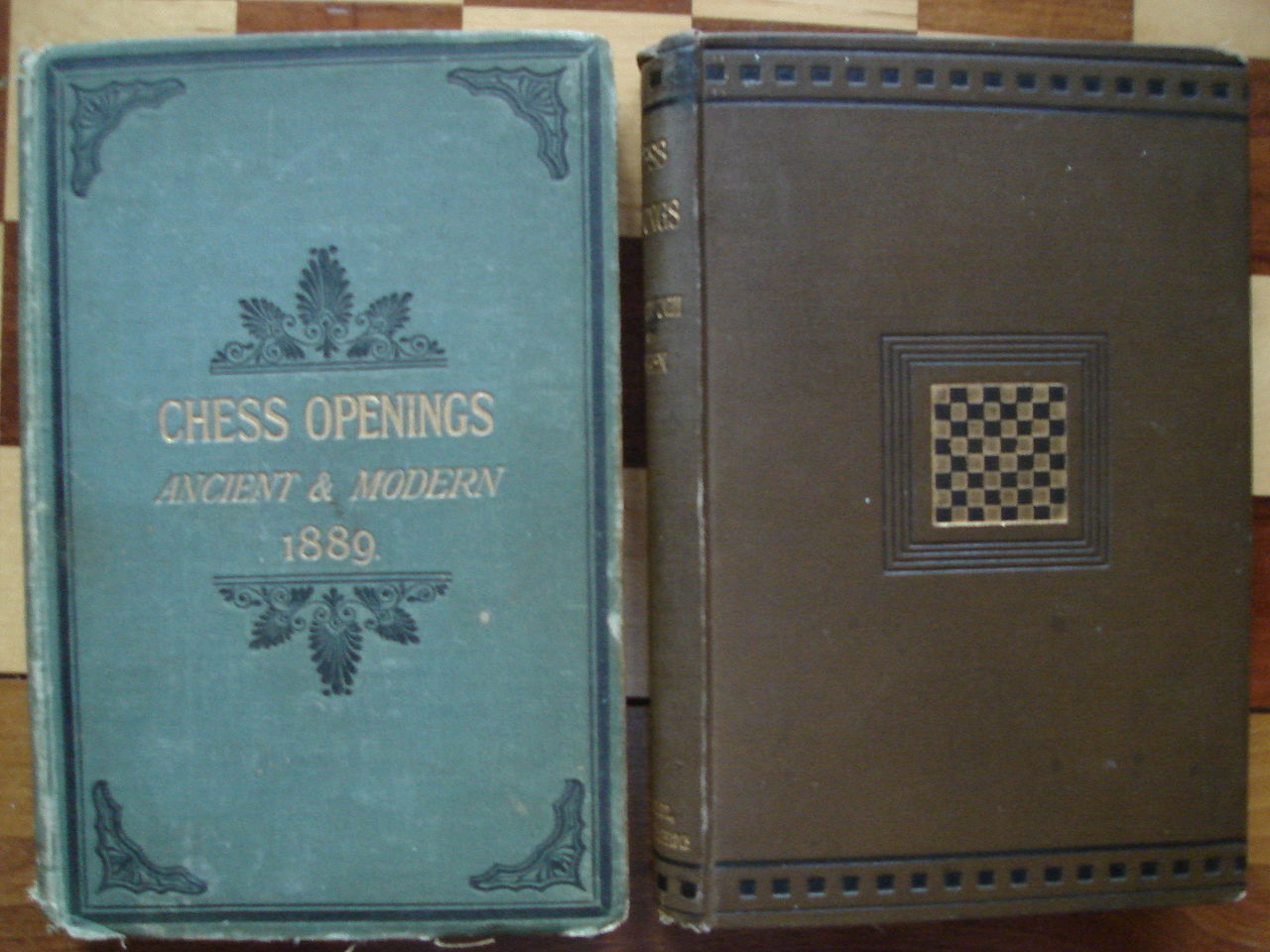
The Ranken Variation is a good line for White in the Four Knights Opening, analysed in the Chess Players Chronicle, 1879 by
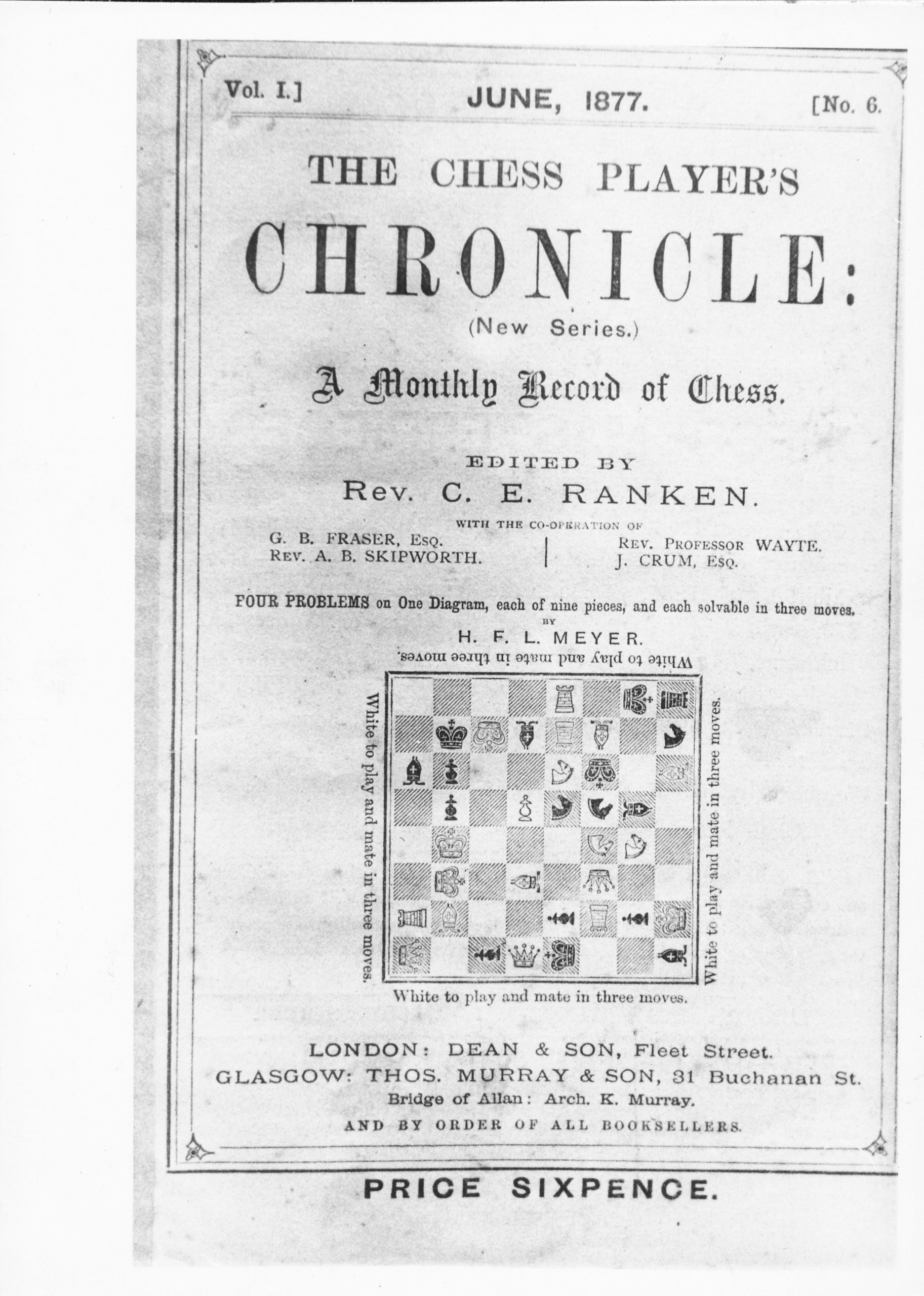
first president of the Oxford University Chess Club.”
BCN remembers Henry Edward Bird who passed away this day, April 11th in 1908.
From The Oxford Companion to Chess by David Hooper & Ken Whyld :
“English player, accountant. He played in 13 strong tournaments, with erratic results; his best achievements were: Vienna 1873, a tie with L. Paulsen for fifth place; Paris 1878, fourth place shared with Mackenzie; Manchester 1890. third prize shared with Mackenzie after Tarrasch and Blackburne. He also played in numerous minor tournaments, notably tying with Gunsberg for first prize at London 1889. His most important match was against Steinitz in 1866 for the first to win eleven games. He was adjudged the loser when he was
called to the USA on business, the score standing +5 = 5—7 in favour of his opponent. This was a creditable result in the circumstances, for he played each game after a day’s work (Steinitz, however, was not so strong a player as he later became.) In 1886 Bird drew a match with Burn(+ 9—9). One of the most ingenious tacticians of his time, Bird played in the attacking style prevalent in his youth. He usually chose openings that were regarded as bizarre, although many of them, e.g. the Dragon Variation, have since gained acceptance.

Bird was probably the best known and longest serving habitue of the London coffee-house known as Simpson’s Divan. ‘A rosy-cheeked, blue-eyed, fair-headed boy’, he first attended around 1846 and was a constant visitor for more than 50 years, after which he was described as ‘majestic in stature, in girth, in the baldness of his great head, less majestic in the litter of tobacco ash upon his waistcoat … with a pleasant smiling countenance’. He suffered from gout which eventually so incapacitated him that he was largely confined to his home for the last years of his life.
Besides writing booklets on railway finance he wrote several books on chess. They are not without interest although the content is sometimes inaccurate and often disorganized. Bird’s Modern Chess and Chess Masterpieces (1887) contains more than 200 games, about half of them his own. Chess History and Reminiscences (1893) contains an account of contemporary players and chess affairs.
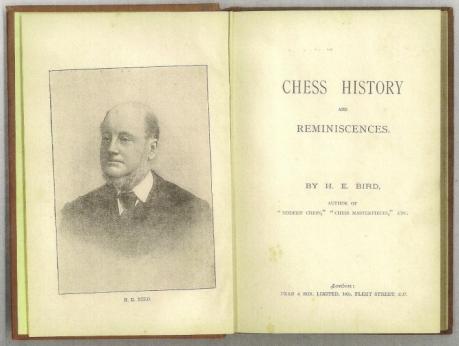
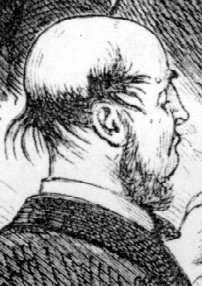
Bird-Mason New York 1876 French Defence, Exchange Variation :
For this game Bird was awarded the BRILLIANCY PRIZE.
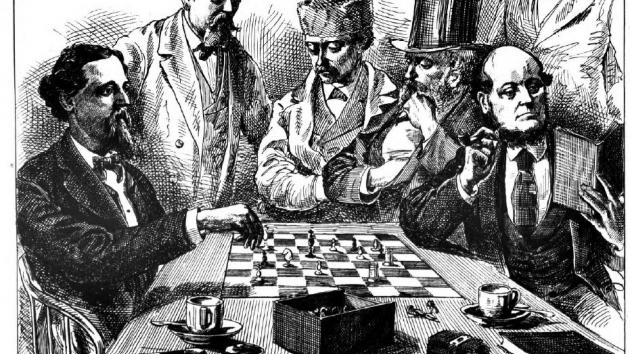
The Bird Attack is variation in the Italian opening strongly advocated by Stamma and no less strongly by Biro. In May 1843 saint-Amant played it against Staunton in their first match and five years later Bird adopted the variation, playing it in many tournaments, notably with fair success at Vienna 1882, London 1883, and Nuremberg 1883.
The Bird Defence, a reply to the Spanish opening given in the first edition of Bilguer’s Handbuch, 1843. Pioneered by Bird, e.g. against Anderssen in 1854, and used on occasion by grandmasters such as Tarrasch, Spielmann, and Spassky, this defence has not gained wide acceptance.
The Bird Opening, sometimes called the Dutch Attack by analogy with the Dutch Defence. In 1873, after an absence of six years from chess, Bird played a match with Wisker. ‘Having forgotten familiar openings, I commenced adopting KBP for first move, and finding it led to highly interesting games out of the usual groove, I became partial to it. ’ Bird had also forgotten unfamiliar openings, for
1 f4 (given by Lucena) had been played by Bourdonnais, Williams, and others of that period. However Bird’s consistent adoption of the move led to its becoming a standard opening, although
never popular.
From Wikipedia :
Henry Edward Bird (Portsea in Hampshire, 14 July 1830 – 11 April 1908) was an English chess player, and also an author and accountant. He wrote a book titled Chess History and Reminiscences, and another titled An Analysis of Railways in the United Kingdom.
Although Bird was a practicing accountant, not a professional chess player, it has been said that he “lived for chess, and would play anybody anywhere, any time, under any conditions.”
At age 21, Bird was invited to the first international tournament, London 1851. He also participated in tournaments held in Vienna and New York City. In 1858 he lost a match to Paul Morphy at the age of 28, yet he played high-level chess for another 50 years. In the New York tournament of 1876, Bird received the first brilliancy prize ever awarded, for his game against James Mason.
In 1874 Bird proposed a new chess variant, which played on an 8×10 board and contained two new pieces: guard (combining the moves of the rook and knight) and equerry (combining the bishop and knight). Bird’s chess inspired José Raúl Capablanca to create another chess variant, Capablanca Chess, which differs from Bird’s chess only by the starting position.
It was Bird who popularized the chess opening now called Bird’s Opening (1.f4), as well as Bird’s Defense to the Ruy Lopez (1.e4 e5 2.Nf3 Nc6 3.Bb5 Nd4). Bird’s Opening is considered sound, though not the best try for an opening advantage. Bird’s Defense is regarded as slightly inferior, but “trappy”.
According to Edward Winter Bird lived at these addresses :
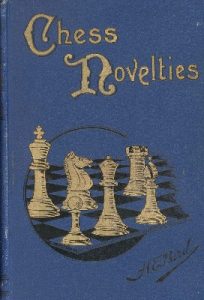
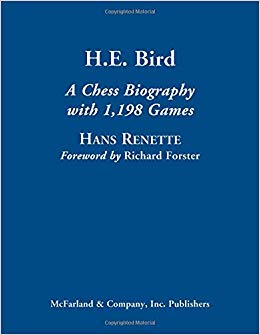
BCN remembers IM Čeněk Kottnauer (24-ii-1910 14-ii-1996)
Čeněk Kottnauer was born in Prague on Thursday, February 24th, 1910. Čeněk was employed in the Ministry of Education in Prague.
Whilst playing in the Lucerne International tournament (28-xii-1952 03-i-1953) he sought political asylum :
From the Milwaukee Journal, January 3, 1953 we have
“Czech Chess Star Asks for Asylum
Lucerne, Switzerland – Cenek Kottnauer, 42, Czecho-Slovakian chess champion and an employee of the ministry of education in Prague, announced Saturday that he would not return to Czech-Slovakia and would request political asylum in Switzerland. Kottnauer had been participating in a chess tournament.
He said that the political situation in his country had grown “more and more critical” and he wanted “to leave before it is too late”. He said that he had been divorced recently and had no children in Czech-Slovakia”.
In a January 2009 post to the English Chess Forum Leonard Barden wrote :
“Cenek Kottnauer defected from Czechoslovakia during the Lucerne New Year tournament of 1952-3 (I am precise on this because I was present). His wife Daniela joined him there, having been smuggled from Prague in the boot of a diplomat’s car. Kottnauer had been a water polo player of international standard before 1939 so came into serious chess only his mid-30s. He made his name with his good showing in the Prague v Moscow match of 1946 and his Bxh7+ win then against Kotov. He competed in great tournaments like Groningen 1946 and Moscow 1947; his first visit to England was in 1947 when the Czech team came here.

In the 1940s he had a job in the Czech sports ministry but got implicated in the purges following the Slansky trial. He also believed that Pachman and Opocensky were involved in the campaign against him.”
Čeněk married Daniela (née Horska, also Czech, having met in Austria) and they had a son Daniel VR Kottnauer. Daniela was born in 1934 and was 24 years younger than Čeněk. She died on February 20th 2008 in a hospice in Essen, Germany close to where Daniel currently resides. Daniel has been a pianist and singer for 30 years, an event manager for 19 years and a coach and VIP limousine driver for 5 years and may be found on LinkedIn.
Čeněk became a British citizen on 16th December 1960 when he obtained naturalisation certificate BNA64338.
In 1965 Čeněk and Daniela were living at Flat 2, 7-8 Bathurst Street, London, W2.
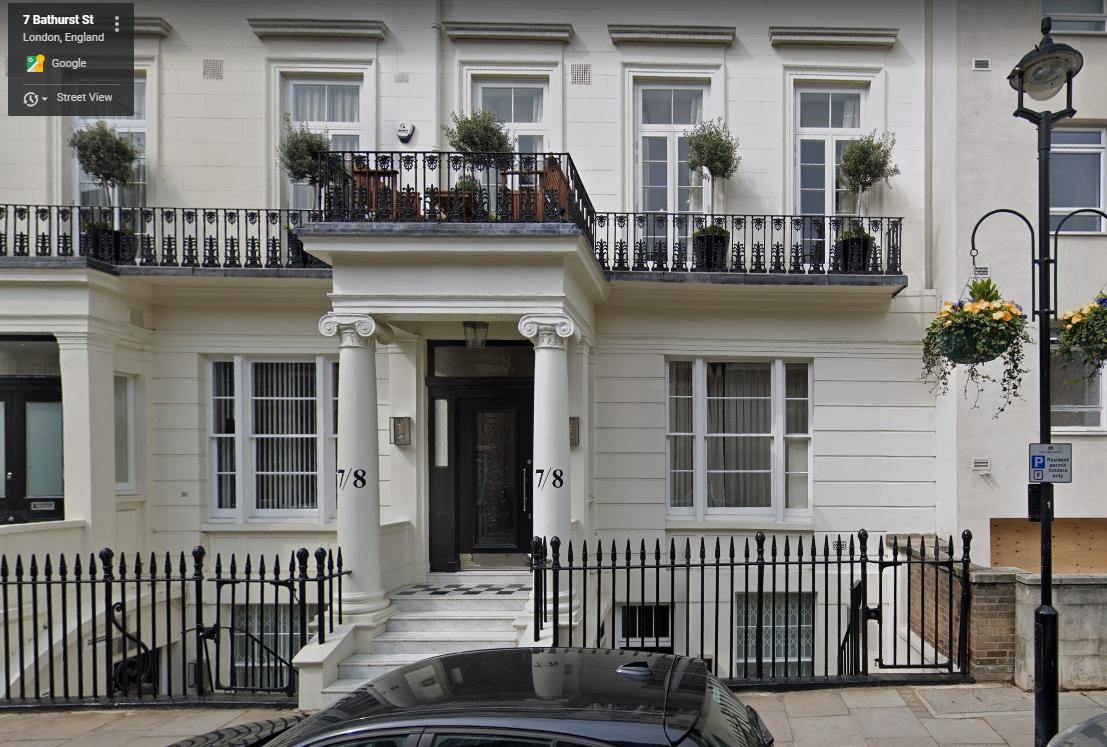
In Kings, Commoners and Knaves (Russell Enterprises, 1999), page 108, Edward Winter wrote :
“The obituaries of Čeněk Kottnauer (1910-1996) have, in common with all of the encyclopaedia entries on him, been strangely wanting in pre-1940s references to his chess career. Czech magazines of the 1930s contain occasional games by ‘Kottnauer’ (no forename or initial given), including the following :
Source : Československý šach, January, 1932, page 9. The score was also given, with notes, by Vera Menchik, on page 153 of the April 1932 issue of The Social Chess Quarterly. ”
From Šachový Týdeník, 25th February, 2010 that Čeněk was twice Prague lightning champion.
In 1943 Čeněk was a clear first overall with 10.5/13 in the Zlin tournament.
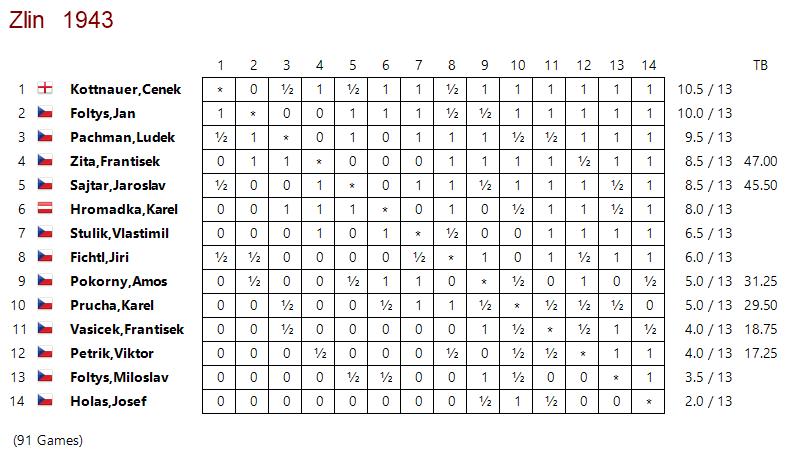

From The Oxford Companion to Chess (OUP, 1984), David Hooper & Ken Whyld :
International Master (1950), International Arbiter (1951), a Czech player who emigrated to England in 1953 and was naturalised in 1960. He played in Olympiads for Czechoslovakia (1950*, 1952), on the second occasion making the best score (+10=5) on the fourth board, and in two Olympiads for England (1964, 1968). In 1961 he won the Beverwijk Masters tournament (not the concurrent grandmasters event) with a clean score, a fine achievement.
*Ed : In fact, this is not true since Czechoslovakia did not send a team to Dubrovnik 1950. This was the last year the event was limited to sixteen countries.
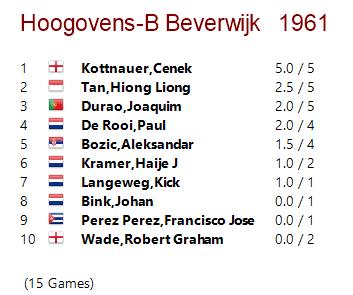
Consulting the 2nd edition (1992) of Hooper & Whyld may cause disappointment since there is no entry for CK.
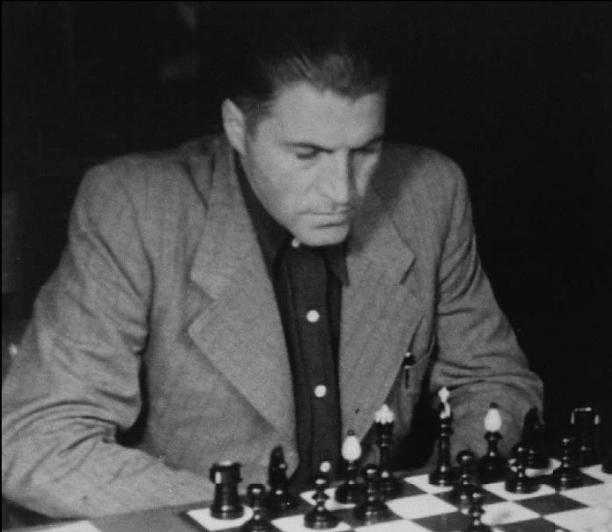
From The Encyclopaedia of Chess (Robert Hale 1970 & 1976), Anne Sunnucks :
“International Master (1950) and International Judge (1951).
Born on 24th February 1910. Kottnauer represented Czechoslovakia in the 1952 Olympiad in Helsinki. In the years after the war his successes in international tournaments included 3rd at Beverwijk 1947, =2nd at Vienna 1947, 4th at Bad Gadstein 1948 and 1st at Lucerne 1953.
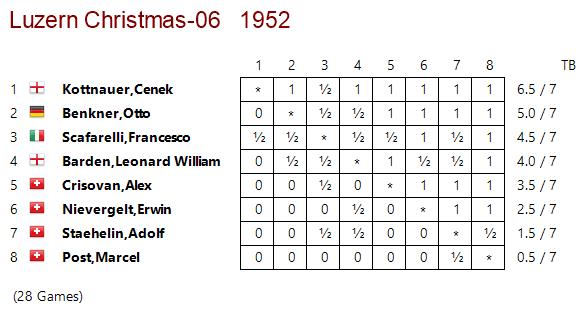
After the Lucerne tournament he sought political asylum in Switzerland. He later settled in England and became a naturalised British citizen. He played for the British Chess Federation in the Olympiads of 1964 and 1968.
Kottnauer has played in the British Championship twice. In 1961 he came =4th, and in 1962 he came =3rd.”
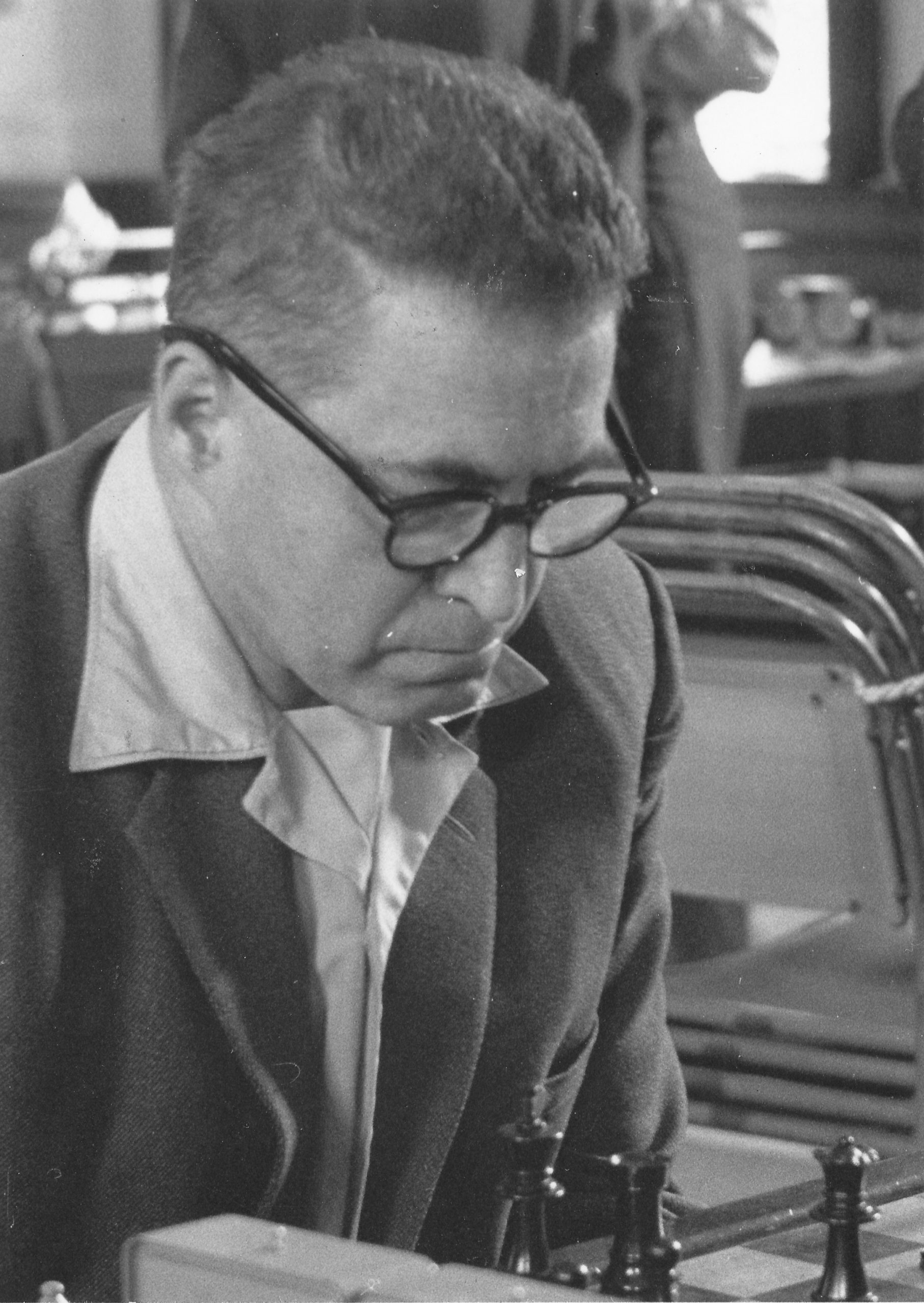
From The Encyclopaedia of Chess (Batsford, 1977), Harry Golombek OBE (entry written by Bill Hartston):
“Born in Czechoslovakia, Kottnauer played for that country in many events including the 1952 Olympiad. He emigrated in 1953 and subsequently took British nationality, representing England in the Olympiads of 1964 and 1968. Awarded FIDE titles of international master in 1950 and International Judge in 1951. Winner of Lucerne 1953 International tournament.

Co-author with TD Harding and GS Botterill of The Sicilian Sozin, Batsford, London, 1974.”
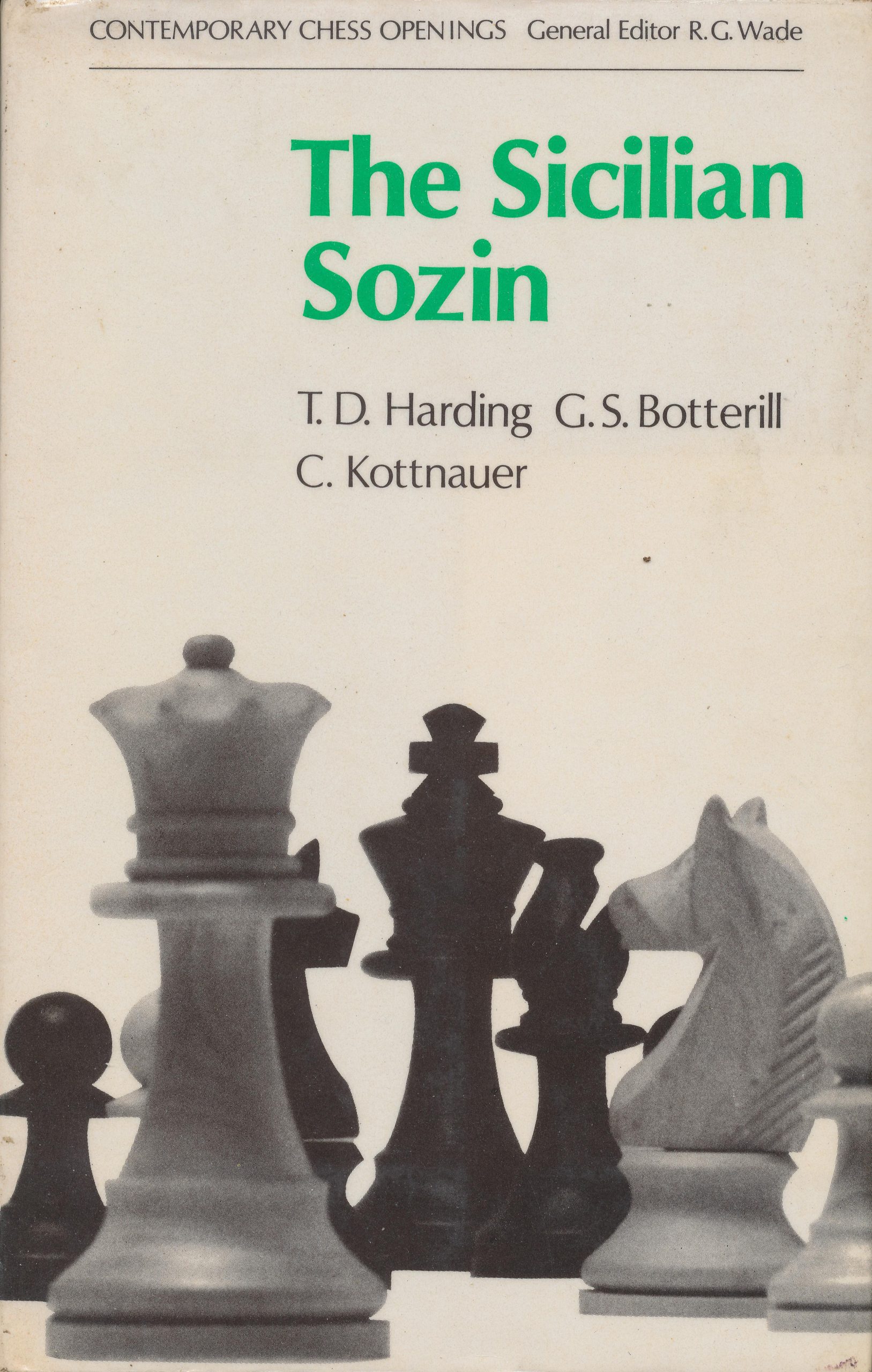
From British Chess (Pergamon Press, 1983) we have this insight from Tim Harding :
“At a time when home-grown International Masters were thin on the ground in Britain (the 1950s and 1960s) this Czech-born IM brought a lot of valuable experience to BCF teams.
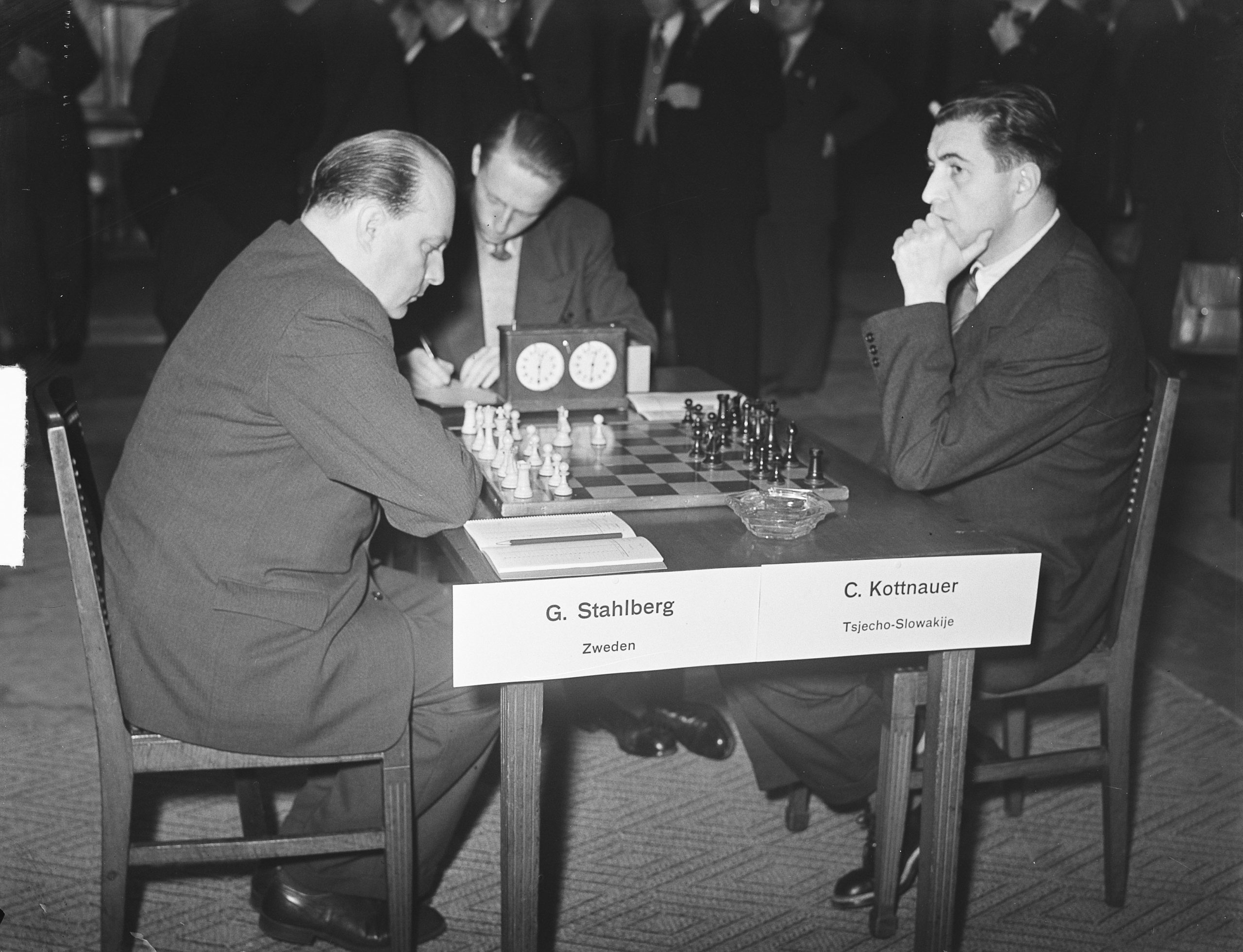
After emigrating to England in 1953, he became naturalized and subsequently represented the BCF in the Tel Aviv, 1964 and Lugano, 1968, Olympiads. On board one in 1964 he scored +8 =7 -3 (63.9%) on board two below Penrose in 1968 (with some board one games) he scored 41.7: +3 =5 -4.
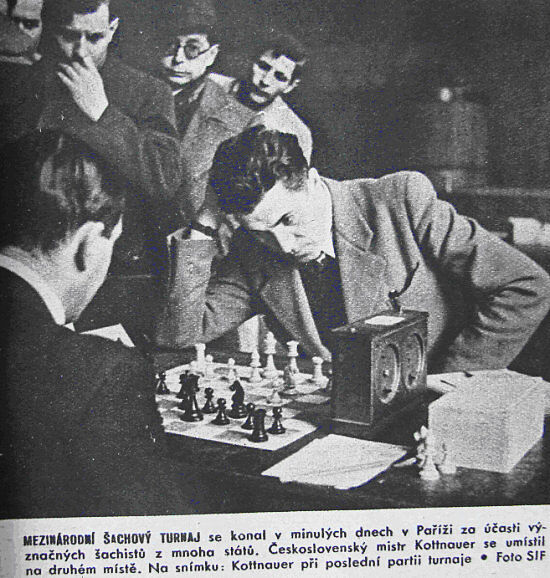
When FIDE rating lists appeared in the early 1970s, Kottnauer was listed at 2370 but by this time had more or less retired from active play at the top level, although he took (and still takes) a keen interest in coaching promising young players, He was one of the most regular and most valuable coaches at the one-day junior training events organised by the London Chess Association at the Mary Ward Centre in Bloomsbury, London in the mid-1970s.

At this time he also wrote many articles for his friend Grandmaster Pachman, who had been freed to live in West Germany where he became editor of Schach-Archiv, and also made a major contribution to the Batsford opening theory work. The Sicilian Sozin, written in collaboration with George Botterill and Tim Harding, and published in 1974.
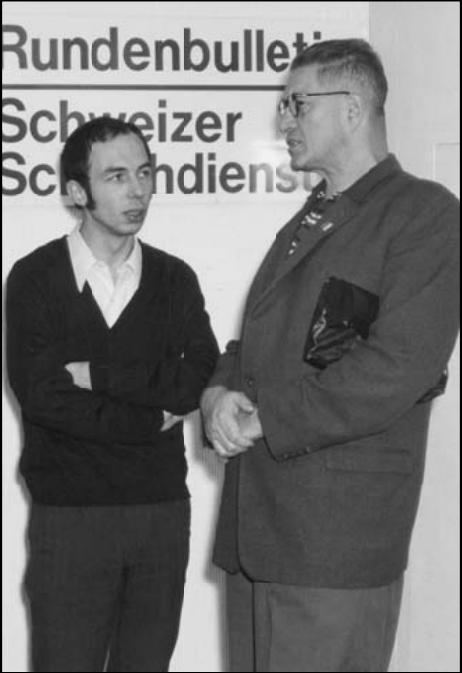
Kottnauer’s most active years as a player were however 1946-53; in the year that he came to England he took first prize in the Lucerne, 1953 International tournament. Had he been a professional player throughout the the 1950s, there is little doubt that he would have become a grandmaster.
As early as the end of the war, when regular play resumed, he was almost of that strength (as wins against Kotov and Smyslov in the February, 1946 Prague v Moscow match showed) but lacking in experience at the top level, which told against him at Groningen, 1946, when he was placed 13th with 9 points out of a possible 19 in a very strong field. This was the first great post-war tournament, with nine Master and eleven Grandmasters (including Botvinnik and former world champion Euwe).
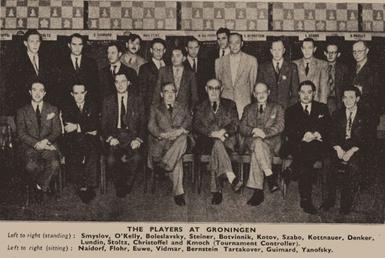
Also in 1946 Kottnauer scored wins against Simagin (in Prague) and Levenfish (in Leningrad) and was clearly one of the up-and-coming stars in a strong Czech team that included Filip and Pachman. In 1950 he was one of the first players to be awarded the FIDE title of International Master.
The following year he was also made a FIDE International Judge (now known as FIDE Arbiter).
Unfortunately there was no Czech representation at the Dubrovnik, 1950 Olympiad, but in 1952, one of his last appearances for Czechoslovakia, Kottnauer achieved a remarkable record playing board four (below Filip, Pachman and Sajtar) at the Helsinki Olympiad. He went through unbeaten with ten wins and five draws (83.3%) and easily won the board prize.
Kottnauer shortly thereafter came to England where he eventually made a successful career as an executive with Trust House Forte’s hotel group; he has also helped with the BBC overseas service Czech-language broadcasts. He lives in West Central London with his wife and their son.
The following is undoubtedly Kottnauer’s most famous win.
and here we have the same game analysed by Tryfon Gavriel :
From British Chess Magazine, Volume CXVI (116, 1996), Number 4 (April), pp 202-203 we have this obituary by Bernard Cafferty :
Čeněk Kottnauer, the Czech/British IM, and the first chess defector died in St. Margaret’s Hospital, London, on 14th February after heart trouble and abdominal cancer.
A giant of a man, a fine athlete and swimmer, he was born on 24th February 1910 and came to prominence in the 1942 tournament in Prague in which Alekhine took part. He extended the great man to 70 moves before resigning. His wins against Kotov and Smyslov in the Moscow-Prague match of 1946 and his 13th place in the great Groningen tournament of the same year confirmed his status, as did his excellent showing for Czechoslovakia in the 1952 Olympiad at Helsinki (+10=5-0 on fourth board). He also took part in the 1947 Chigorin Memorial in Moscow, and won a tournament at Lucerne in early 1953, the same year in which he emigrated to Britain.
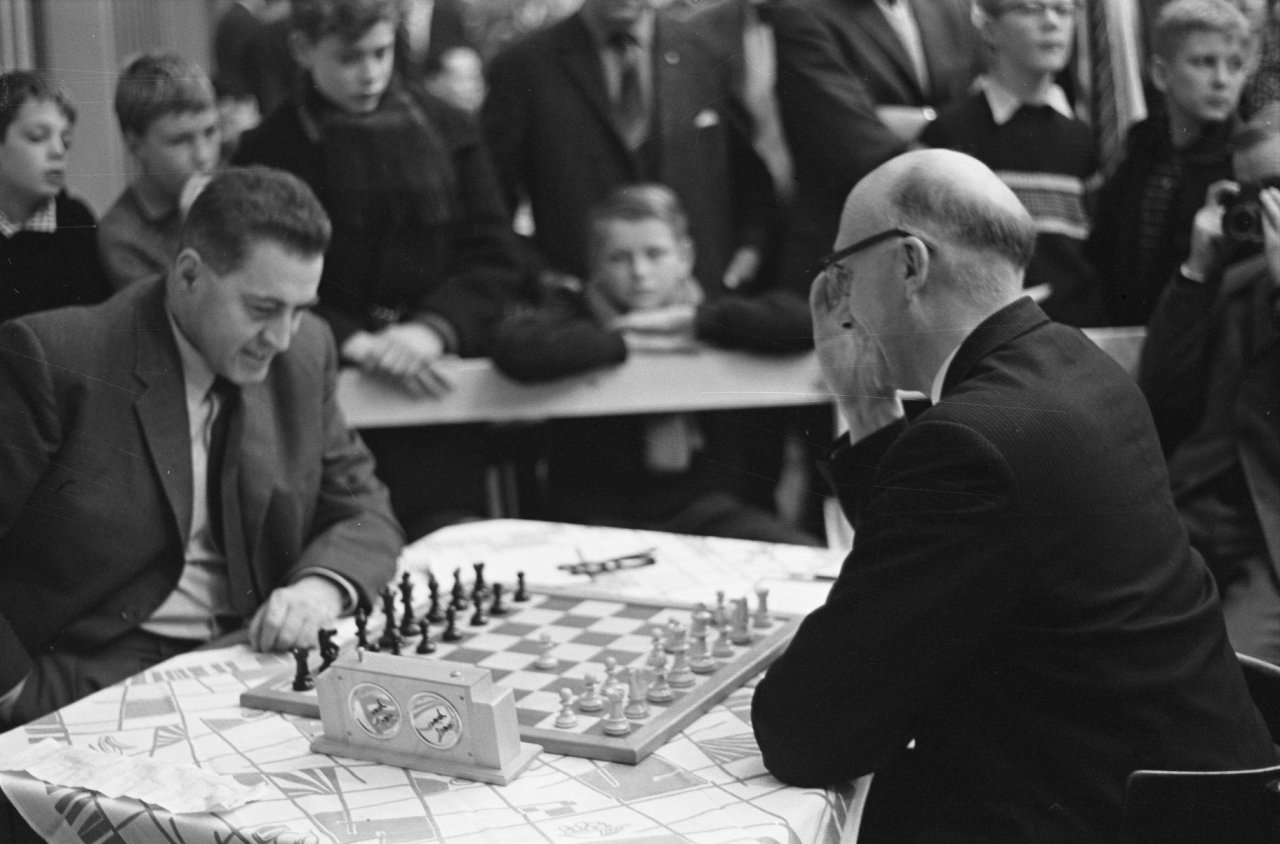
On this form he would have gained the GM title had he continued playing, but he had to take a full-time job (with Trusthouse Forte) to support his family.
Čeněk had met his much younger wife in Austria, though she too was Czech. They had a son. The master’s appearences were therefore limited to London League matches and other sporadic events. That he had lost none of his skill was shown when he played top board for England at the 1964 Tel-Aviv Olympiad (Penrose was not available) and made +8=7-3. His only other big event was the Lugano Olympiad of 1968 when he was on second board and made +3=5-4.

Čeněk (pronounced CHEnek) Kottnauer was one of the early professionals in the German Bundesliga; on a visit to his Bayswater flat in 1995 by Murray Chandler and myself, Čeněk told us about the great transport difficulties he had in those days. He mentioned that he had recently had a heart bypass operation and showed us the medication he had to take on a regular basis, opining that after Golombek and Milner-Barry he would be the next to go.
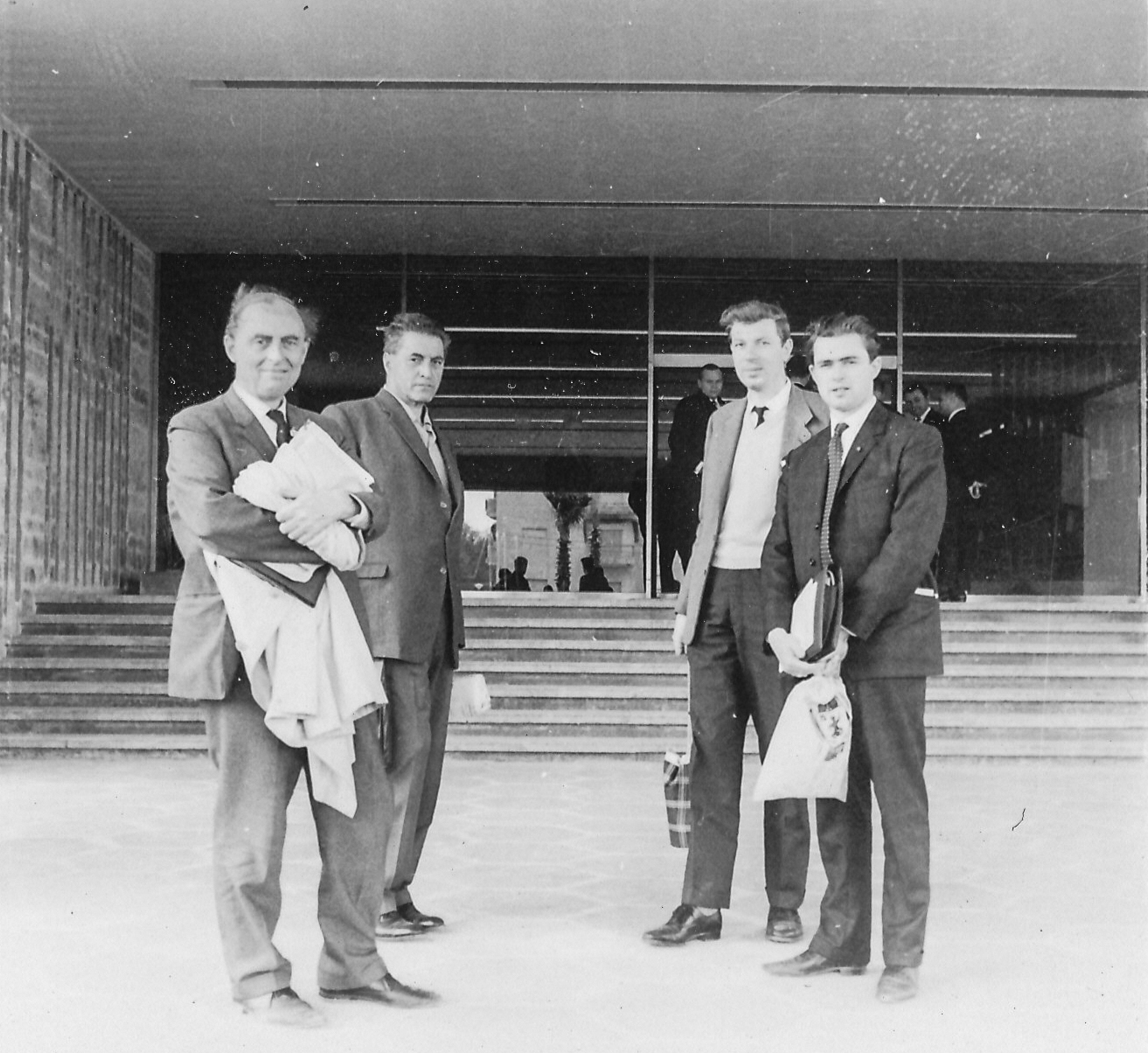
Čeněk was involved in junior coaching in London for many years, wrote extensively for the Dutch and German press and in recent years was a regular visitor to the Lloyds Bank Masters to see old friends and acquaintances. Amongst those he coached were Julian Hodgson, William Watson and Dharshan Kumaran, as well as Stuart Conquest.

In Stuart’s case he came regularly to Hastings to do the coaching which was financed by the Slater Foundation and by Lloyds Bank.
The fruit of his effort was Stuart’s 1981 World U-16 title in Argentina, where Čeněk’s great physical strength came in handy when the huge trophy had to be carried back to Britain.

All his pupils and friends will attest to his wonderful manner. A great personality has left us.”
According to Leonard Barden “Čeněk’s students included Demis Hassabis, then aged six. He once told me that Dharshan Kumaran, then seven, was the more talented of the pair but that Demis was also ‘very clever and tricky’ ”
Daniel tells us that Nigel Short visited his family home for coaching and we believe that both Anita and Mira Rakshit were CKs students. Doubtless there were many more…
Leonard added :
“After he retired he did chess coaching and, although never named in the BCF’s list of coaches, was the most successful of all in terms of achievements by those he taught. He normally did weekly sessions of a couple of hours and got results through his challenging and sceptical approach to ideas from his pupils.
Kottnauer pupils included Hodgson, Watson, and Kumaran, who all became grandmasters. When he came to our junior invitation tournaments in the mid-seventies I used to give a prize of a game and session with him to exceptional talents. So he played Nigel Short in spring 1975 (probably Short’s first one-to-one with an IM) and was enthusiastic about his promise.
In 1981 when Stuart Conquest was going to the the world U16 championship in Argentina Cenek coached him for several months beforehand and went with him to the event. No news reports were available during the tournament so the first I knew was when Cenek phoned me on his return to London and complained that he was tired having to carry this enormous trophy home (Stuart had broken his arm before the event and played in a sling) and how the food had been terrible but that Eliskases, who was involved in the organisation, had sworn him to secrecy.

I used to visit him a couple of times a month for talk and blitz sessions and have warm memories. A great guy, and a significant figure in the long departed English chess boom.”
Here is an excellent article from Tim Harding originally on chesscafe.com but now via the Wayback Machine.
Here is an obituary from Bill Hartston
Here is his Wikipedia entry
And finally, according to chessgames.com :
“Cenek Kottnauer was born in Prague. He was awarded the IM title in 1950 and became an International Arbiter in 1951. Kottnauer played the Helsinki Olympiad 1952 on board 4 for Czechoslovakia, scoring +10 =5 -0. In 1953 he won the Lucerne international tournament. That same year, he emigrated to England, and eventually became a naturalized citizen and played for England in the Olympiads of 1964 and 1968. In the 1970s he became one of England’s top coaches of young players.”
BCN remembers IM Čeněk Kottnauer (24-ii-1910 14-ii-1996)
Čeněk Kottnauer was born in Prague on Thursday, February 24th, 1910. Čeněk was employed in the Ministry of Education in Prague.
Whilst playing in the Lucerne International tournament (28-xii-1952 03-i-1953) he sought political asylum :
From the Milwaukee Journal, January 3, 1953 we have
“Czech Chess Star Asks for Asylum
Lucerne, Switzerland – Cenek Kottnauer, 42, Czecho-Slovakian chess champion and an employee of the ministry of education in Prague, announced Saturday that he would not return to Czech-Slovakia and would request political asylum in Switzerland. Kottnauer had been participating in a chess tournament.
He said that the political situation in his country had grown “more and more critical” and he wanted “to leave before it is too late”. He said that he had been divorced recently and had no children in Czech-Slovakia”.
In a January 2009 post to the English Chess Forum Leonard Barden wrote :
“Cenek Kottnauer defected from Czechoslovakia during the Lucerne New Year tournament of 1952-3 (I am precise on this because I was present). His wife Daniela joined him there, having been smuggled from Prague in the boot of a diplomat’s car. Kottnauer had been a water polo player of international standard before 1939 so came into serious chess only his mid-30s. He made his name with his good showing in the Prague v Moscow match of 1946 and his Bxh7+ win then against Kotov. He competed in great tournaments like Groningen 1946 and Moscow 1947; his first visit to England was in 1947 when the Czech team came here.

In the 1940s he had a job in the Czech sports ministry but got implicated in the purges following the Slansky trial. He also believed that Pachman and Opocensky were involved in the campaign against him.”
Čeněk married Daniela (née Horska, also Czech, having met in Austria) and they had a son Daniel VR Kottnauer. Daniela was born in 1934 and was 24 years younger than Čeněk. She died on February 20th 2008 in a hospice in Essen, Germany close to where Daniel currently resides. Daniel has been a pianist and singer for 30 years, an event manager for 19 years and a coach and VIP limousine driver for 5 years and may be found on LinkedIn.
Čeněk became a British citizen on 16th December 1960 when he obtained naturalisation certificate BNA64338.
In 1965 Čeněk and Daniela were living at Flat 2, 7-8 Bathurst Street, London, W2.

In Kings, Commoners and Knaves (Russell Enterprises, 1999), page 108, Edward Winter wrote :
“The obituaries of Čeněk Kottnauer (1910-1996) have, in common with all of the encyclopaedia entries on him, been strangely wanting in pre-1940s references to his chess career. Czech magazines of the 1930s contain occasional games by ‘Kottnauer’ (no forename or initial given), including the following :
Source : Československý šach, January, 1932, page 9. The score was also given, with notes, by Vera Menchik, on page 153 of the April 1932 issue of The Social Chess Quarterly. ”
From Šachový Týdeník, 25th February, 2010 that Čeněk was twice Prague lightning champion.
In 1943 Čeněk was a clear first overall with 10.5/13 in the Zlin tournament.


From The Oxford Companion to Chess (OUP, 1984), David Hooper & Ken Whyld :
International Master (1950), International Arbiter (1951), a Czech player who emigrated to England in 1953 and was naturalised in 1960. He played in Olympiads for Czechoslovakia (1950*, 1952), on the second occasion making the best score (+10=5) on the fourth board, and in two Olympiads for England (1964, 1968). In 1961 he won the Beverwijk Masters tournament (not the concurrent grandmasters event) with a clean score, a fine achievement.
*Ed : In fact, this is not true since Czechoslovakia did not send a team to Dubrovnik 1950. This was the last year the event was limited to sixteen countries.

Consulting the 2nd edition (1992) of Hooper & Whyld may cause disappointment since there is no entry for CK.

From The Encyclopaedia of Chess (Robert Hale 1970 & 1976), Anne Sunnucks :
“International Master (1950) and International Judge (1951).
Born on 24th February 1910. Kottnauer represented Czechoslovakia in the 1952 Olympiad in Helsinki. In the years after the war his successes in international tournaments included 3rd at Beverwijk 1947, =2nd at Vienna 1947, 4th at Bad Gadstein 1948 and 1st at Lucerne 1953.

After the Lucerne tournament he sought political asylum in Switzerland. He later settled in England and became a naturalised British citizen. He played for the British Chess Federation in the Olympiads of 1964 and 1968.
Kottnauer has played in the British Championship twice. In 1961 he came =4th, and in 1962 he came =3rd.”

From The Encyclopaedia of Chess (Batsford, 1977), Harry Golombek OBE (entry written by Bill Hartston):
“Born in Czechoslovakia, Kottnauer played for that country in many events including the 1952 Olympiad. He emigrated in 1953 and subsequently took British nationality, representing England in the Olympiads of 1964 and 1968. Awarded FIDE titles of international master in 1950 and International Judge in 1951. Winner of Lucerne 1953 International tournament.

Co-author with TD Harding and GS Botterill of The Sicilian Sozin, Batsford, London, 1974.”

From British Chess (Pergamon Press, 1983) we have this insight from Tim Harding :
“At a time when home-grown International Masters were thin on the ground in Britain (the 1950s and 1960s) this Czech-born IM brought a lot of valuable experience to BCF teams.

After emigrating to England in 1953, he became naturalized and subsequently represented the BCF in the Tel Aviv, 1964 and Lugano, 1968, Olympiads. On board one in 1964 he scored +8 =7 -3 (63.9%) on board two below Penrose in 1968 (with some board one games) he scored 41.7: +3 =5 -4.

When FIDE rating lists appeared in the early 1970s, Kottnauer was listed at 2370 but by this time had more or less retired from active play at the top level, although he took (and still takes) a keen interest in coaching promising young players, He was one of the most regular and most valuable coaches at the one-day junior training events organised by the London Chess Association at the Mary Ward Centre in Bloomsbury, London in the mid-1970s.

At this time he also wrote many articles for his friend Grandmaster Pachman, who had been freed to live in West Germany where he became editor of Schach-Archiv, and also made a major contribution to the Batsford opening theory work. The Sicilian Sozin, written in collaboration with George Botterill and Tim Harding, and published in 1974.

Kottnauer’s most active years as a player were however 1946-53; in the year that he came to England he took first prize in the Lucerne, 1953 International tournament. Had he been a professional player throughout the the 1950s, there is little doubt that he would have become a grandmaster.
As early as the end of the war, when regular play resumed, he was almost of that strength (as wins against Kotov and Smyslov in the February, 1946 Prague v Moscow match showed) but lacking in experience at the top level, which told against him at Groningen, 1946, when he was placed 13th with 9 points out of a possible 19 in a very strong field. This was the first great post-war tournament, with nine Master and eleven Grandmasters (including Botvinnik and former world champion Euwe).

Also in 1946 Kottnauer scored wins against Simagin (in Prague) and Levenfish (in Leningrad) and was clearly one of the up-and-coming stars in a strong Czech team that included Filip and Pachman. In 1950 he was one of the first players to be awarded the FIDE title of International Master.
The following year he was also made a FIDE International Judge (now known as FIDE Arbiter).
Unfortunately there was no Czech representation at the Dubrovnik, 1950 Olympiad, but in 1952, one of his last appearances for Czechoslovakia, Kottnauer achieved a remarkable record playing board four (below Filip, Pachman and Sajtar) at the Helsinki Olympiad. He went through unbeaten with ten wins and five draws (83.3%) and easily won the board prize.
Kottnauer shortly thereafter came to England where he eventually made a successful career as an executive with Trust House Forte’s hotel group; he has also helped with the BBC overseas service Czech-language broadcasts. He lives in West Central London with his wife and their son.
The following is undoubtedly Kottnauer’s most famous win.
and here we have the same game analysed by Tryfon Gavriel :
From British Chess Magazine, Volume CXVI (116, 1996), Number 4 (April), pp 202-203 we have this obituary by Bernard Cafferty :
Čeněk Kottnauer, the Czech/British IM, and the first chess defector died in St. Margaret’s Hospital, London, on 14th February after heart trouble and abdominal cancer.
A giant of a man, a fine athlete and swimmer, he was born on 24th February 1910 and came to prominence in the 1942 tournament in Prague in which Alekhine took part. He extended the great man to 70 moves before resigning. His wins against Kotov and Smyslov in the Moscow-Prague match of 1946 and his 13th place in the great Groningen tournament of the same year confirmed his status, as did his excellent showing for Czechoslovakia in the 1952 Olympiad at Helsinki (+10=5-0 on fourth board). He also took part in the 1947 Chigorin Memorial in Moscow, and won a tournament at Lucerne in early 1953, the same year in which he emigrated to Britain.

On this form he would have gained the GM title had he continued playing, but he had to take a full-time job (with Trusthouse Forte) to support his family.
Čeněk had met his much younger wife in Austria, though she too was Czech. They had a son. The master’s appearences were therefore limited to London League matches and other sporadic events. That he had lost none of his skill was shown when he played top board for England at the 1964 Tel-Aviv Olympiad (Penrose was not available) and made +8=7-3. His only other big event was the Lugano Olympiad of 1968 when he was on second board and made +3=5-4.

Čeněk (pronounced CHEnek) Kottnauer was one of the early professionals in the German Bundesliga; on a visit to his Bayswater flat in 1995 by Murray Chandler and myself, Čeněk told us about the great transport difficulties he had in those days. He mentioned that he had recently had a heart bypass operation and showed us the medication he had to take on a regular basis, opining that after Golombek and Milner-Barry he would be the next to go.

Čeněk was involved in junior coaching in London for many years, wrote extensively for the Dutch and German press and in recent years was a regular visitor to the Lloyds Bank Masters to see old friends and acquaintances. Amongst those he coached were Julian Hodgson, William Watson and Dharshan Kumaran, as well as Stuart Conquest.

In Stuart’s case he came regularly to Hastings to do the coaching which was financed by the Slater Foundation and by Lloyds Bank.
The fruit of his effort was Stuart’s 1981 World U-16 title in Argentina, where Čeněk’s great physical strength came in handy when the huge trophy had to be carried back to Britain.

All his pupils and friends will attest to his wonderful manner. A great personality has left us.”
According to Leonard Barden “Čeněk’s students included Demis Hassabis, then aged six. He once told me that Dharshan Kumaran, then seven, was the more talented of the pair but that Demis was also ‘very clever and tricky’ ”
Daniel tells us that Nigel Short visited his family home for coaching and we believe that both Anita and Mira Rakshit were CKs students. Doubtless there were many more…
Leonard added :
“After he retired he did chess coaching and, although never named in the BCF’s list of coaches, was the most successful of all in terms of achievements by those he taught. He normally did weekly sessions of a couple of hours and got results through his challenging and sceptical approach to ideas from his pupils.
Kottnauer pupils included Hodgson, Watson, and Kumaran, who all became grandmasters. When he came to our junior invitation tournaments in the mid-seventies I used to give a prize of a game and session with him to exceptional talents. So he played Nigel Short in spring 1975 (probably Short’s first one-to-one with an IM) and was enthusiastic about his promise.
In 1981 when Stuart Conquest was going to the the world U16 championship in Argentina Cenek coached him for several months beforehand and went with him to the event. No news reports were available during the tournament so the first I knew was when Cenek phoned me on his return to London and complained that he was tired having to carry this enormous trophy home (Stuart had broken his arm before the event and played in a sling) and how the food had been terrible but that Eliskases, who was involved in the organisation, had sworn him to secrecy.

I used to visit him a couple of times a month for talk and blitz sessions and have warm memories. A great guy, and a significant figure in the long departed English chess boom.”
Here is an excellent article from Tim Harding originally on chesscafe.com but now via the Wayback Machine.
Here is an obituary from Bill Hartston
Here is his Wikipedia entry
And finally, according to chessgames.com :
“Cenek Kottnauer was born in Prague. He was awarded the IM title in 1950 and became an International Arbiter in 1951. Kottnauer played the Helsinki Olympiad 1952 on board 4 for Czechoslovakia, scoring +10 =5 -0. In 1953 he won the Lucerne international tournament. That same year, he emigrated to England, and eventually became a naturalized citizen and played for England in the Olympiads of 1964 and 1968. In the 1970s he became one of England’s top coaches of young players.”